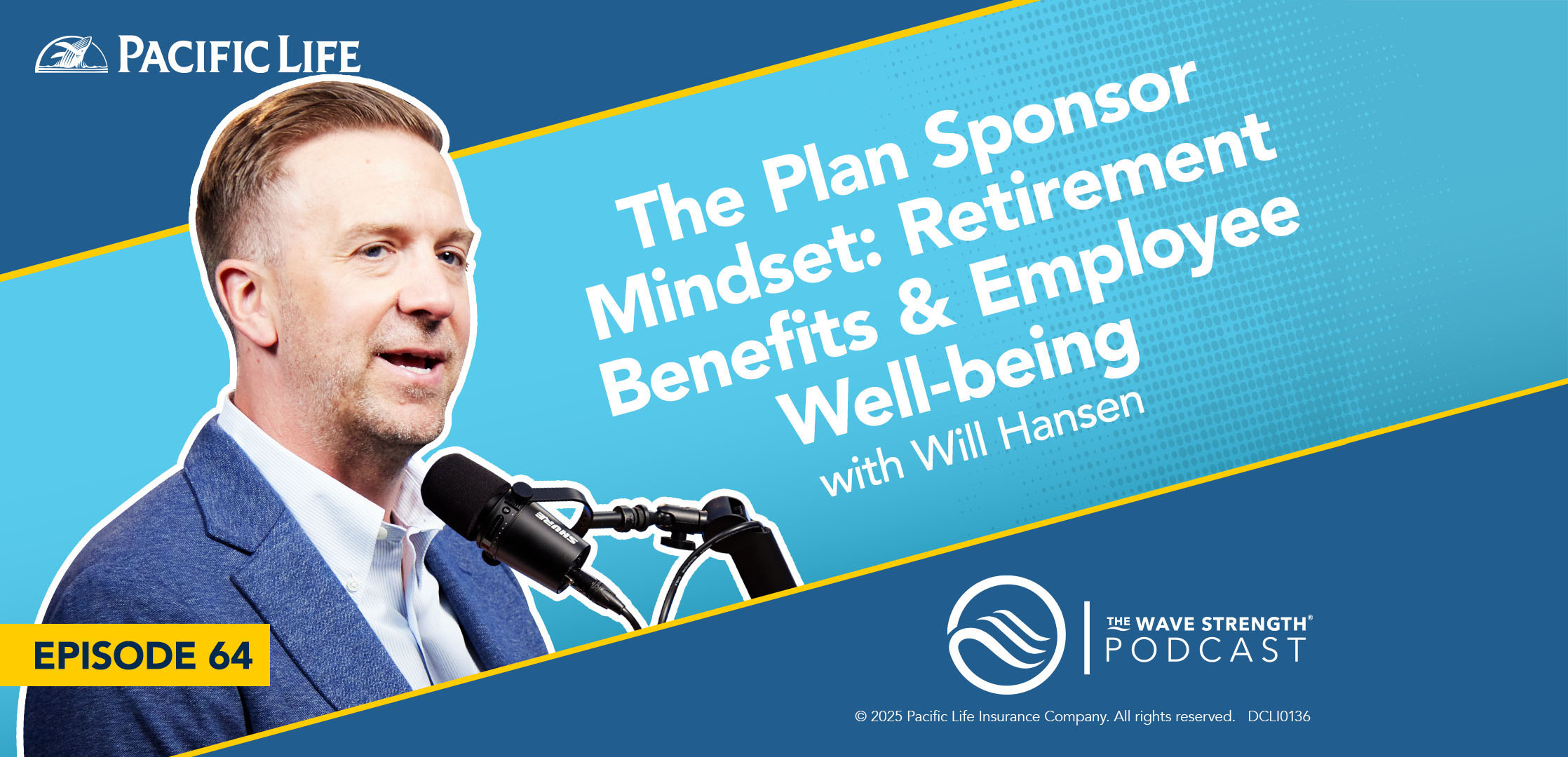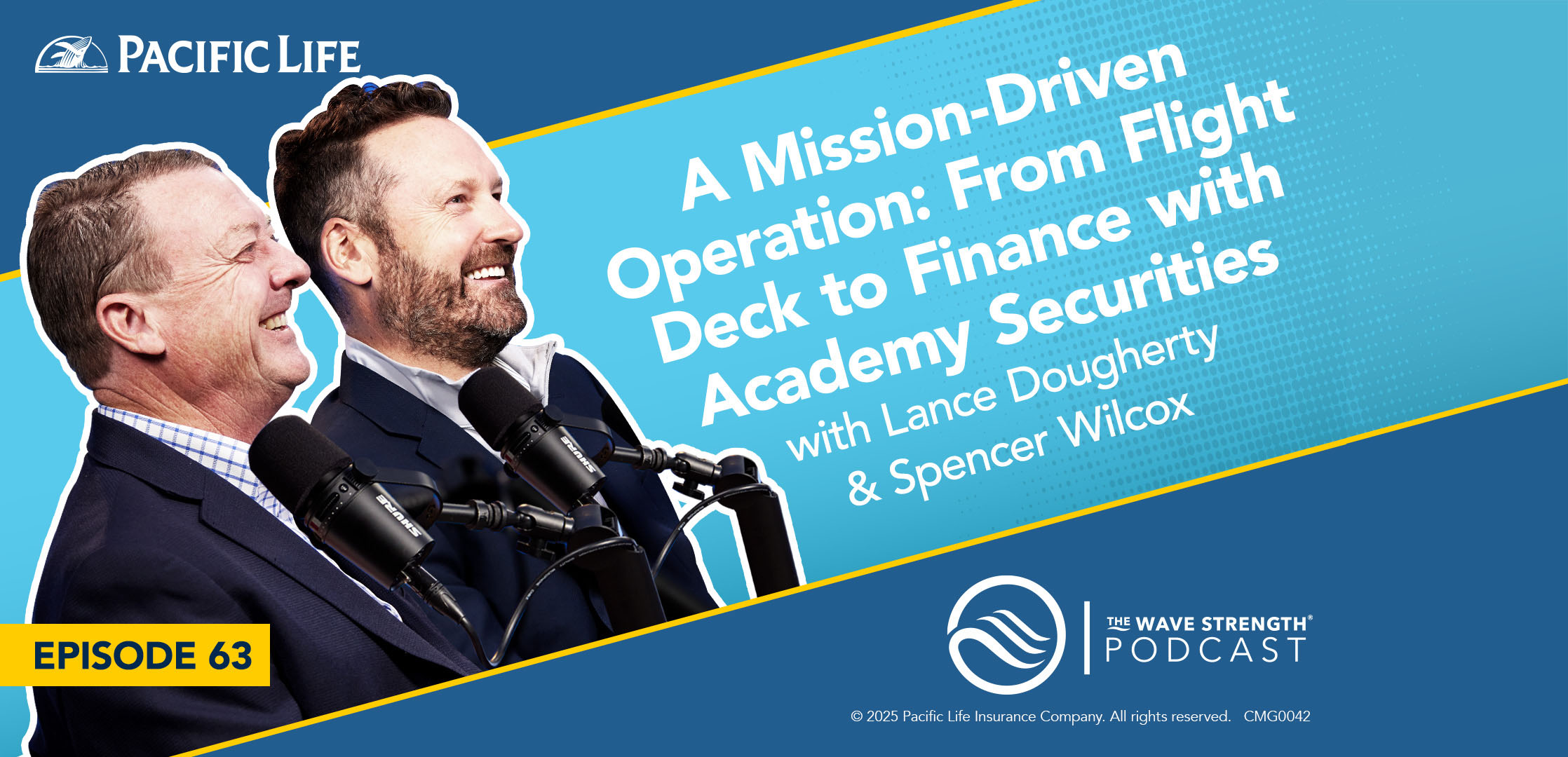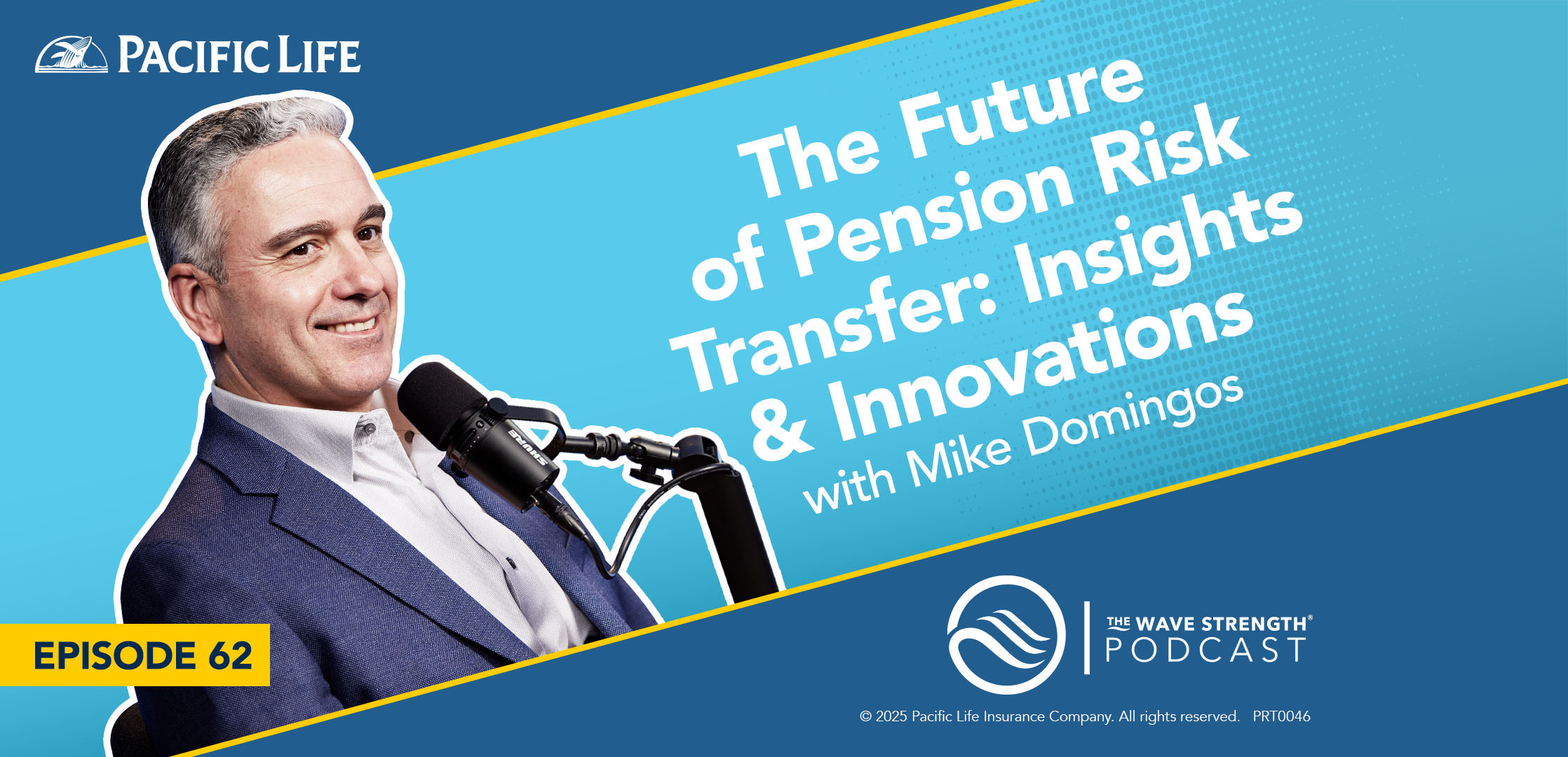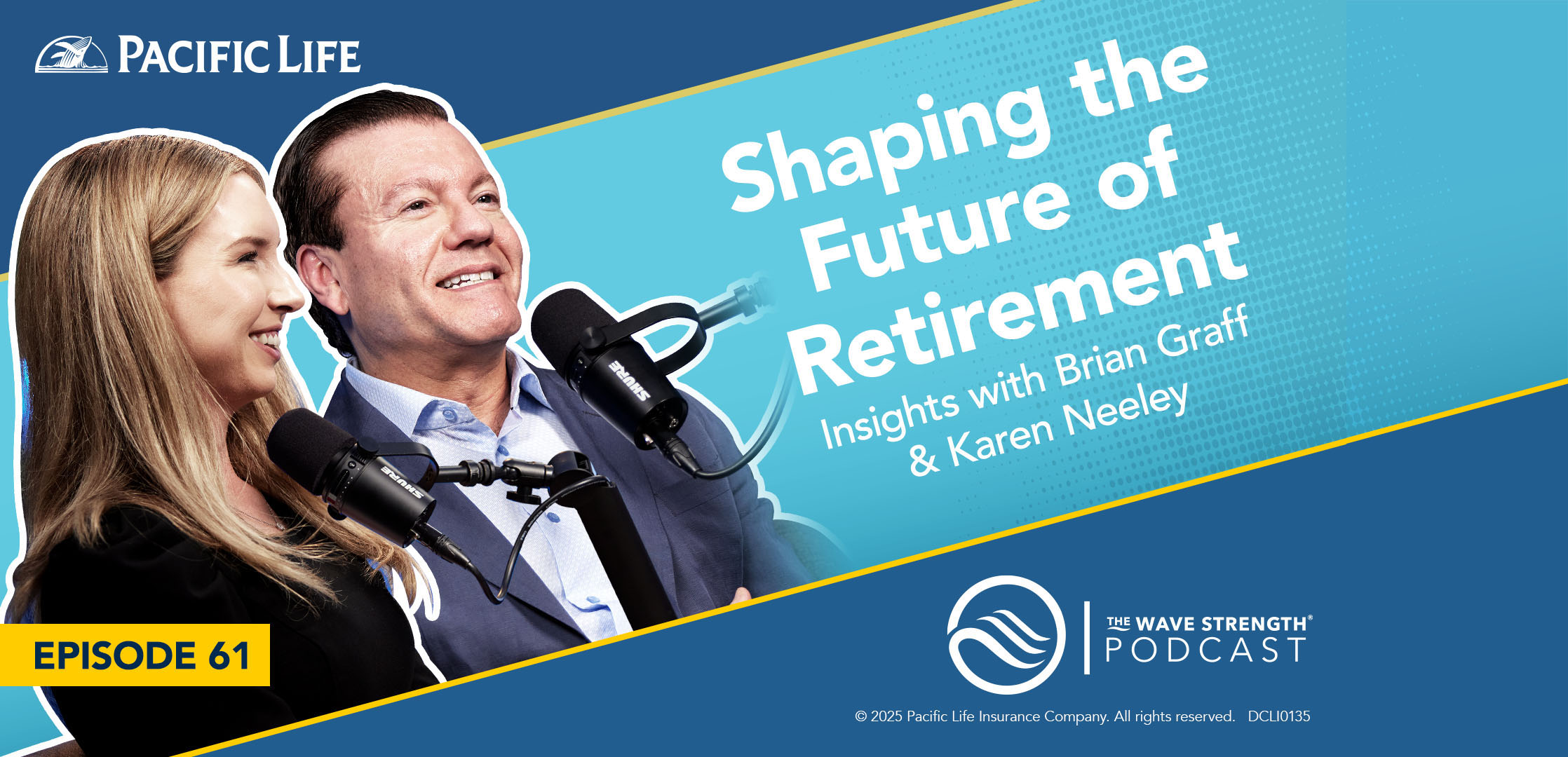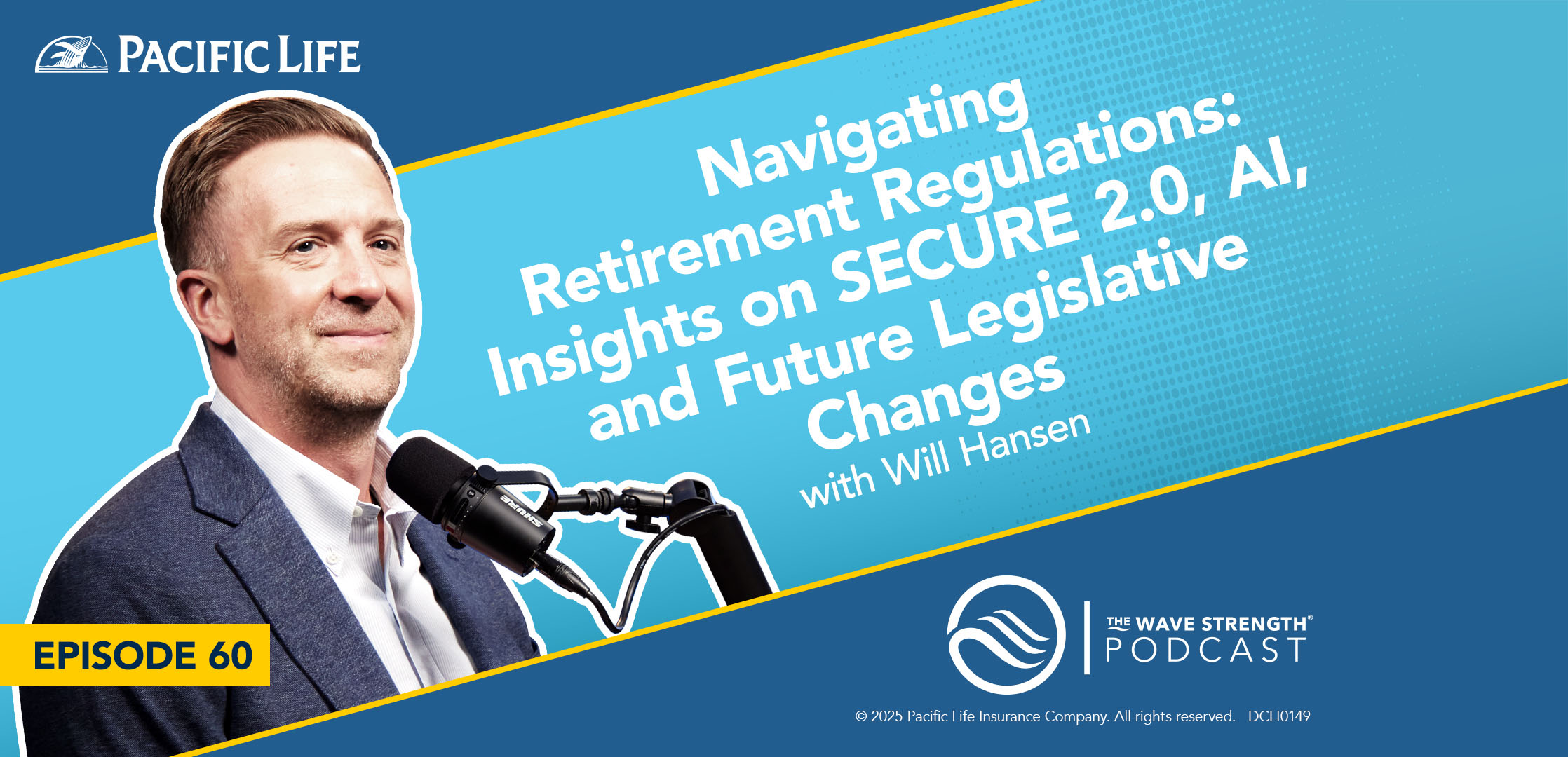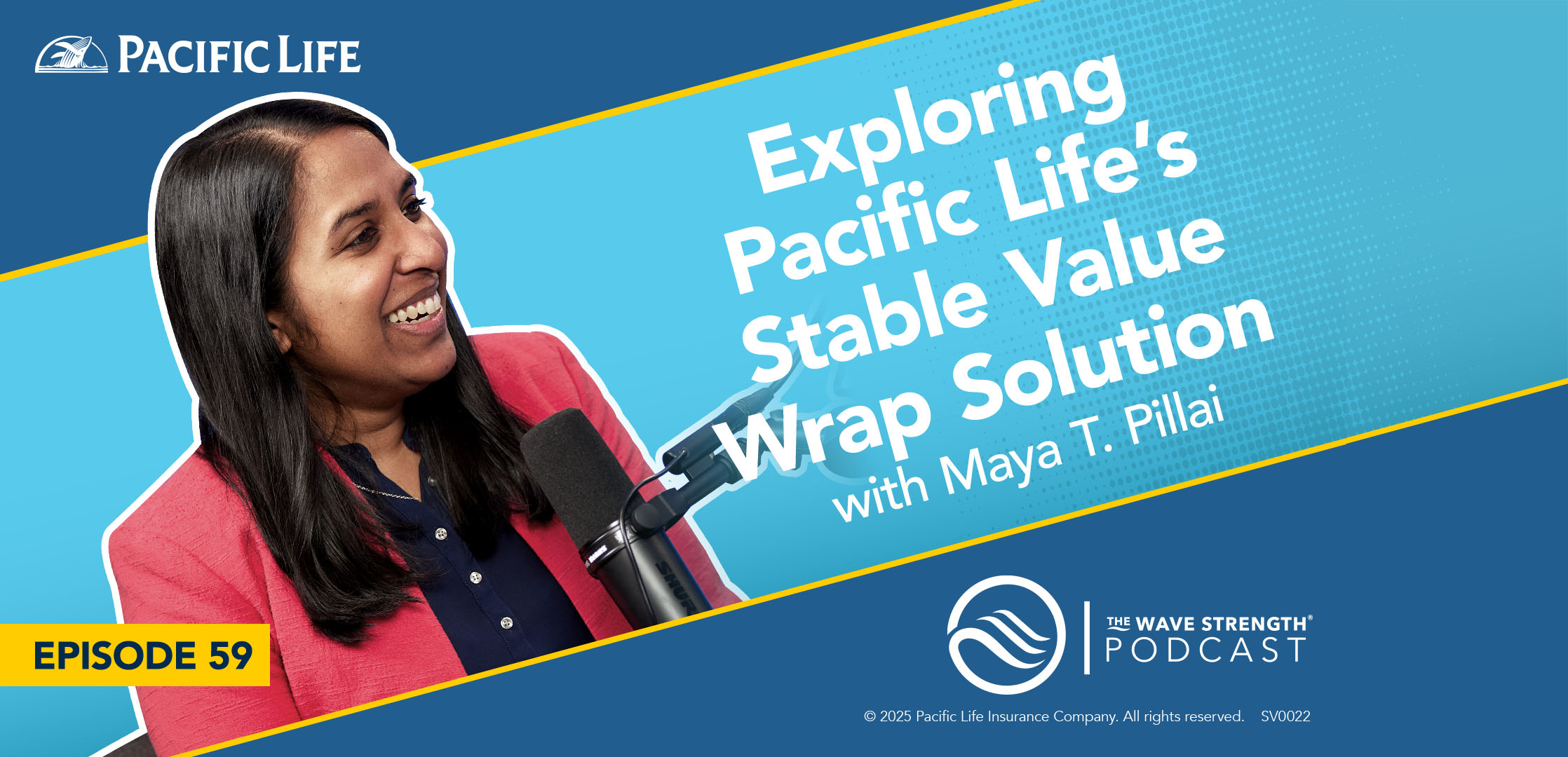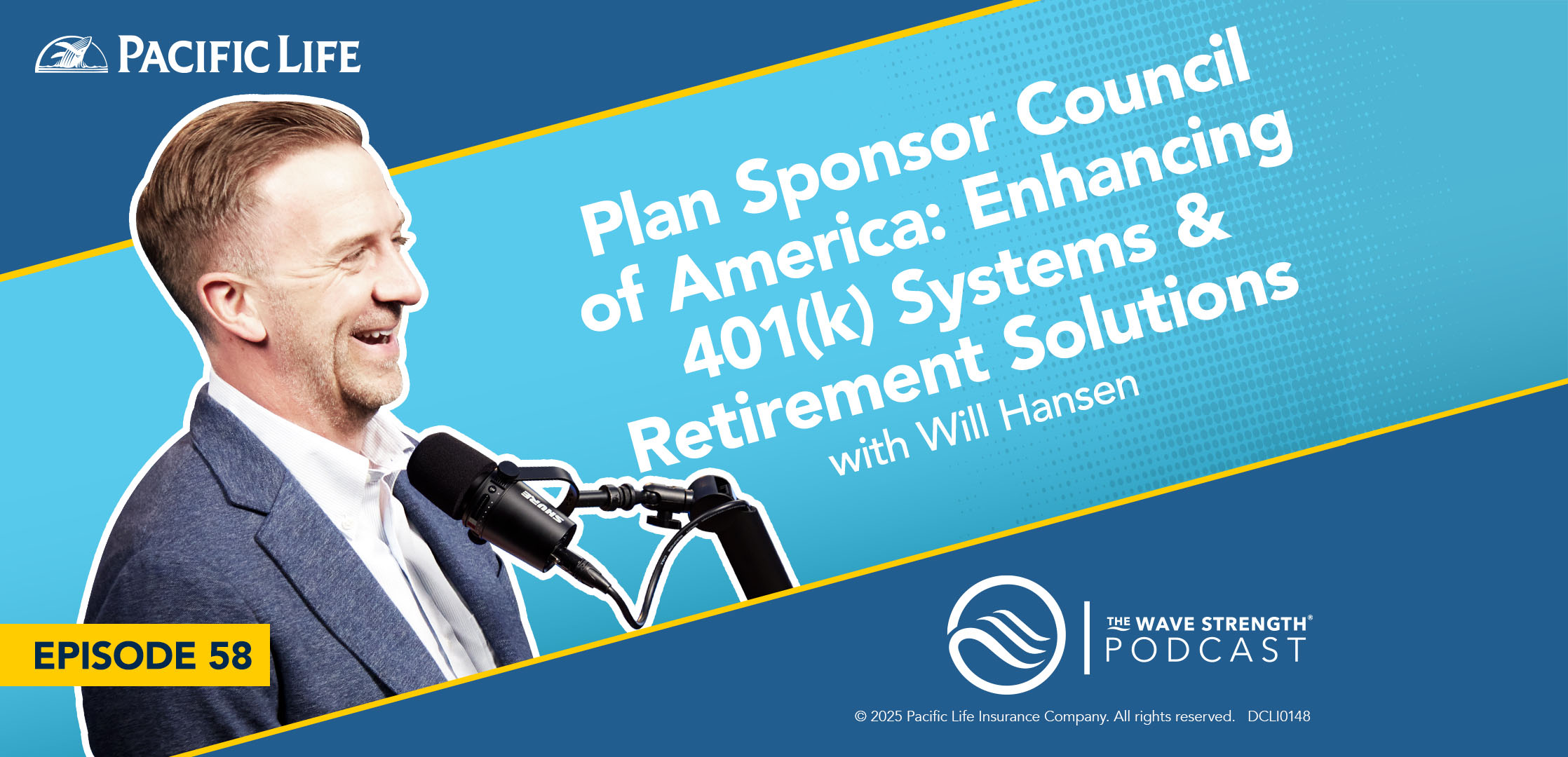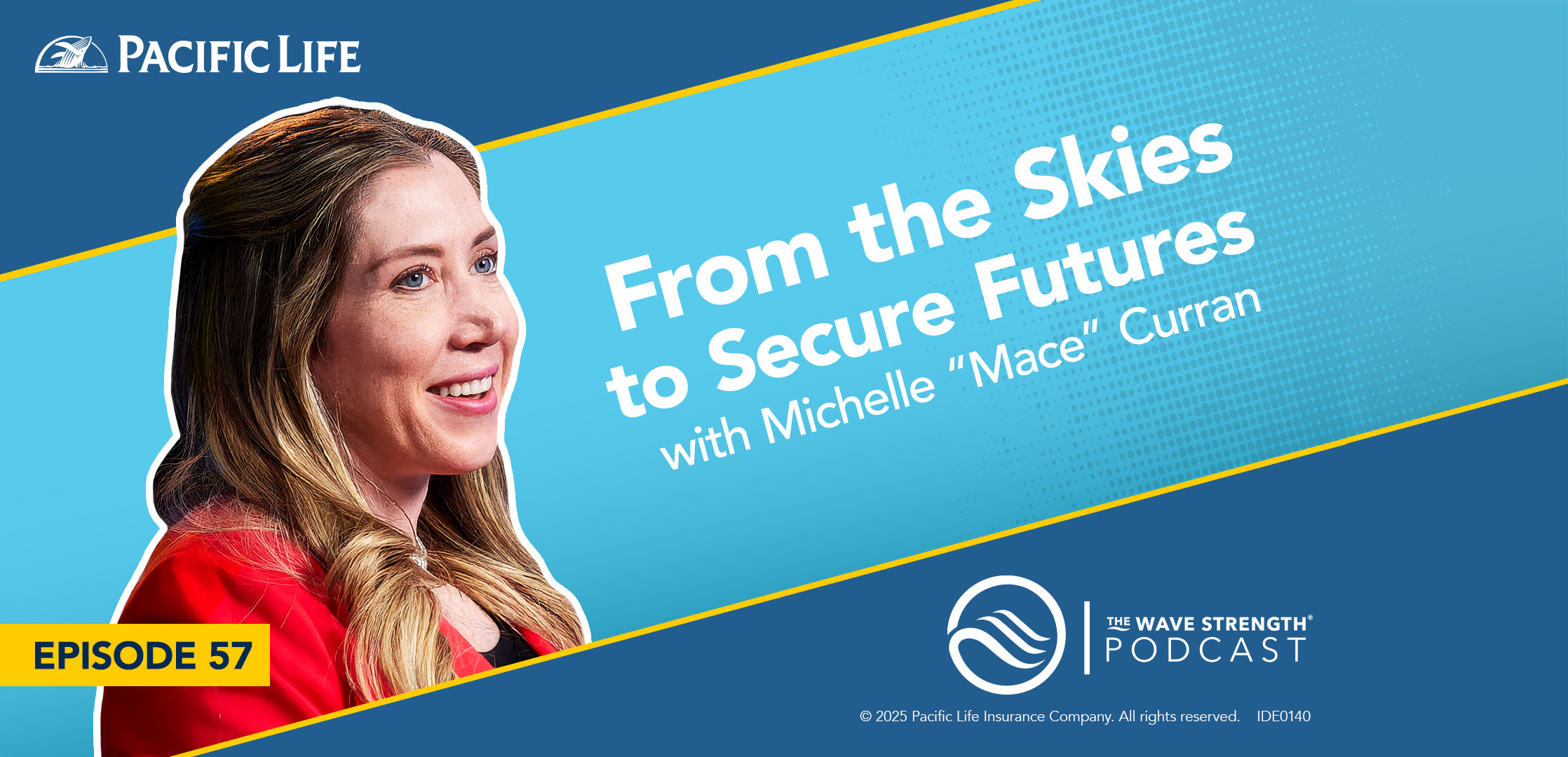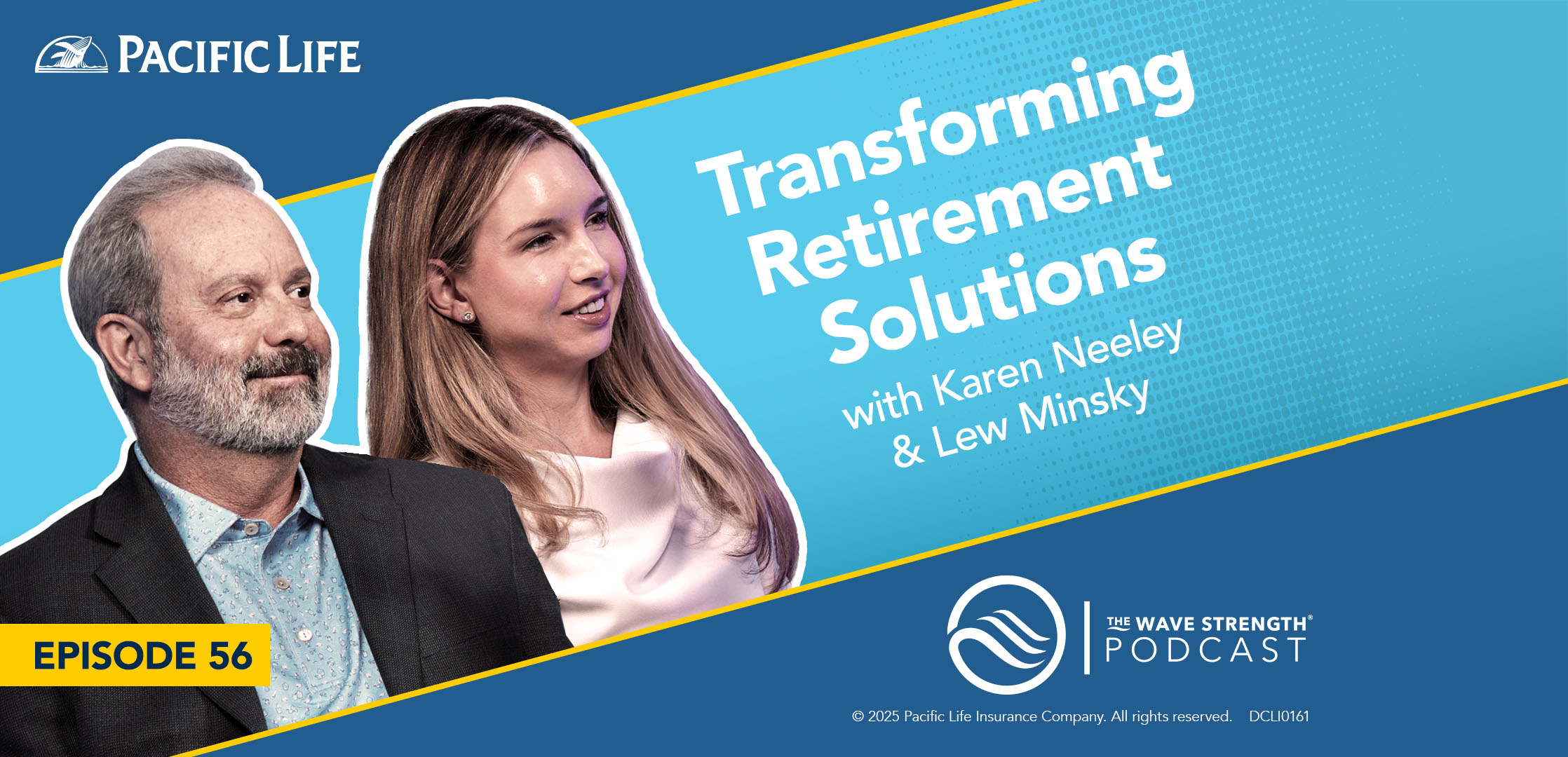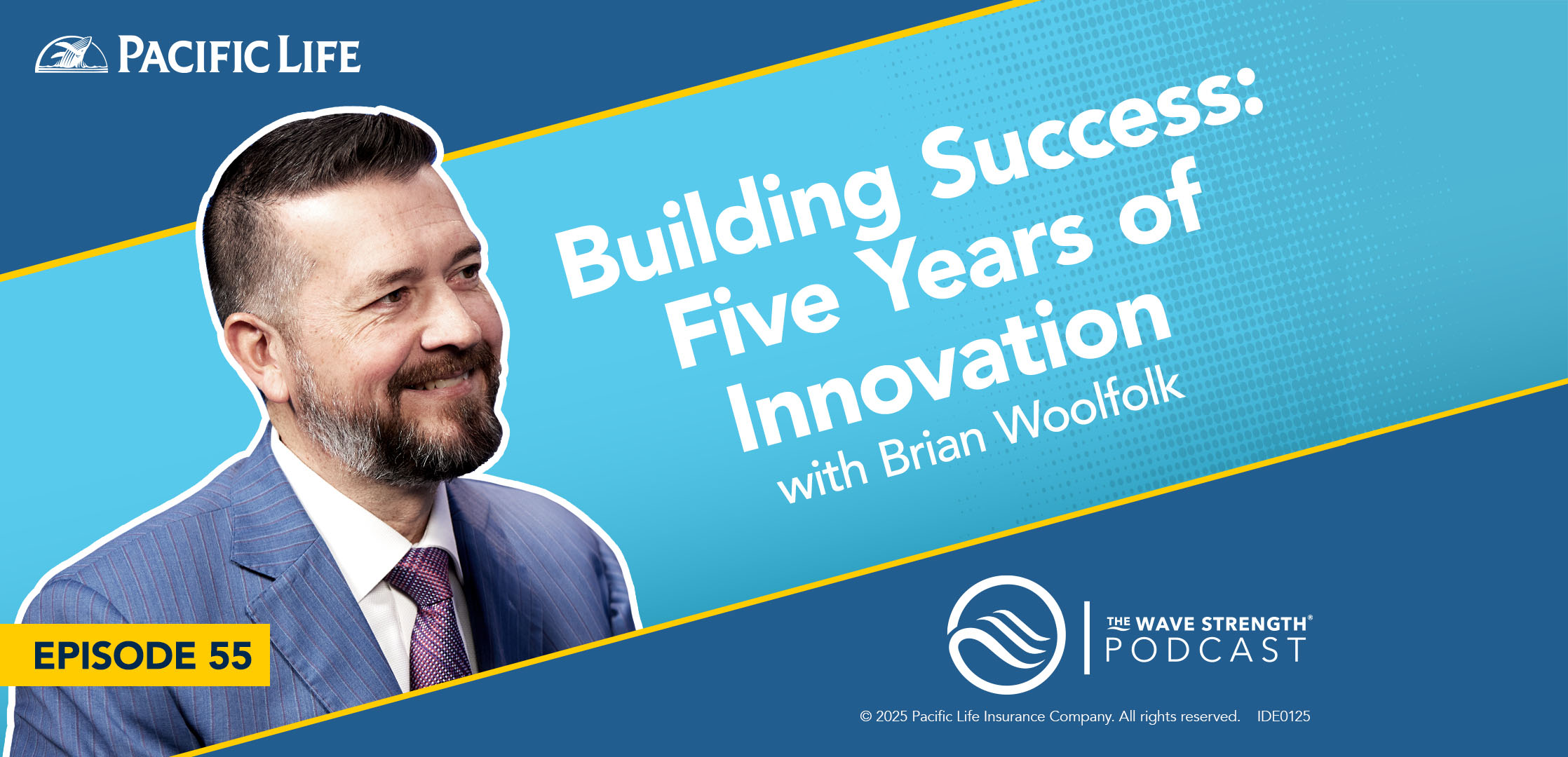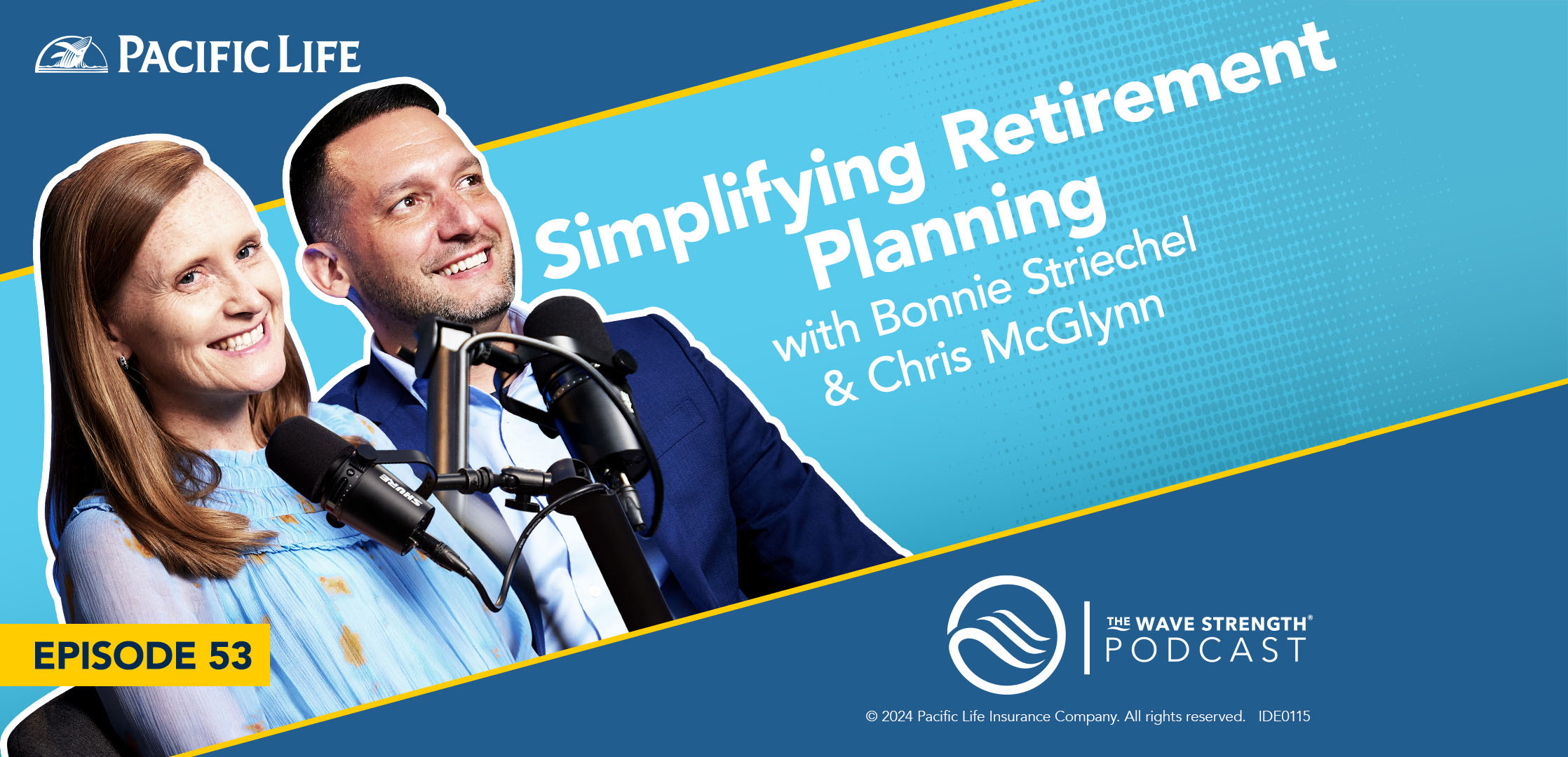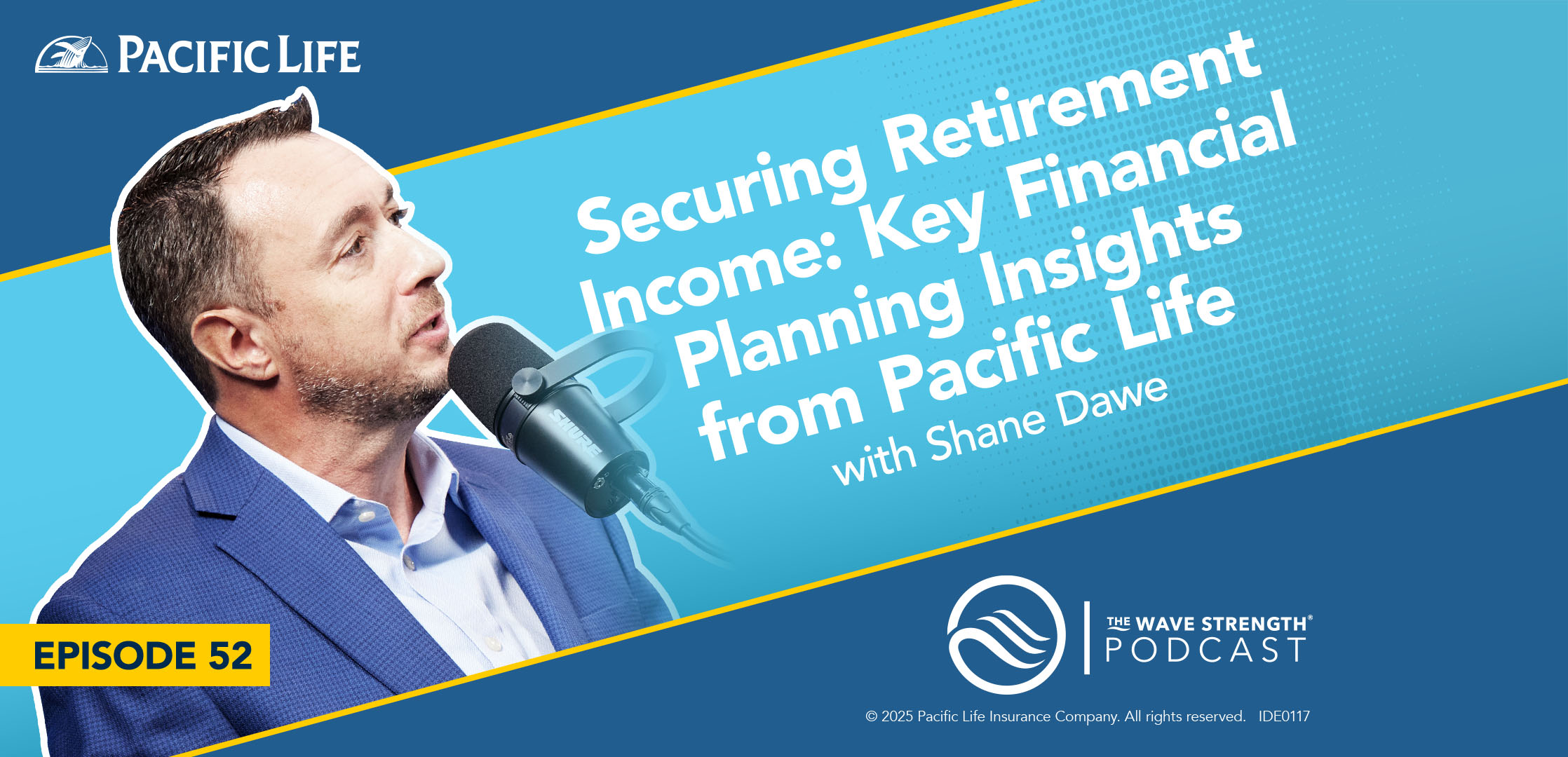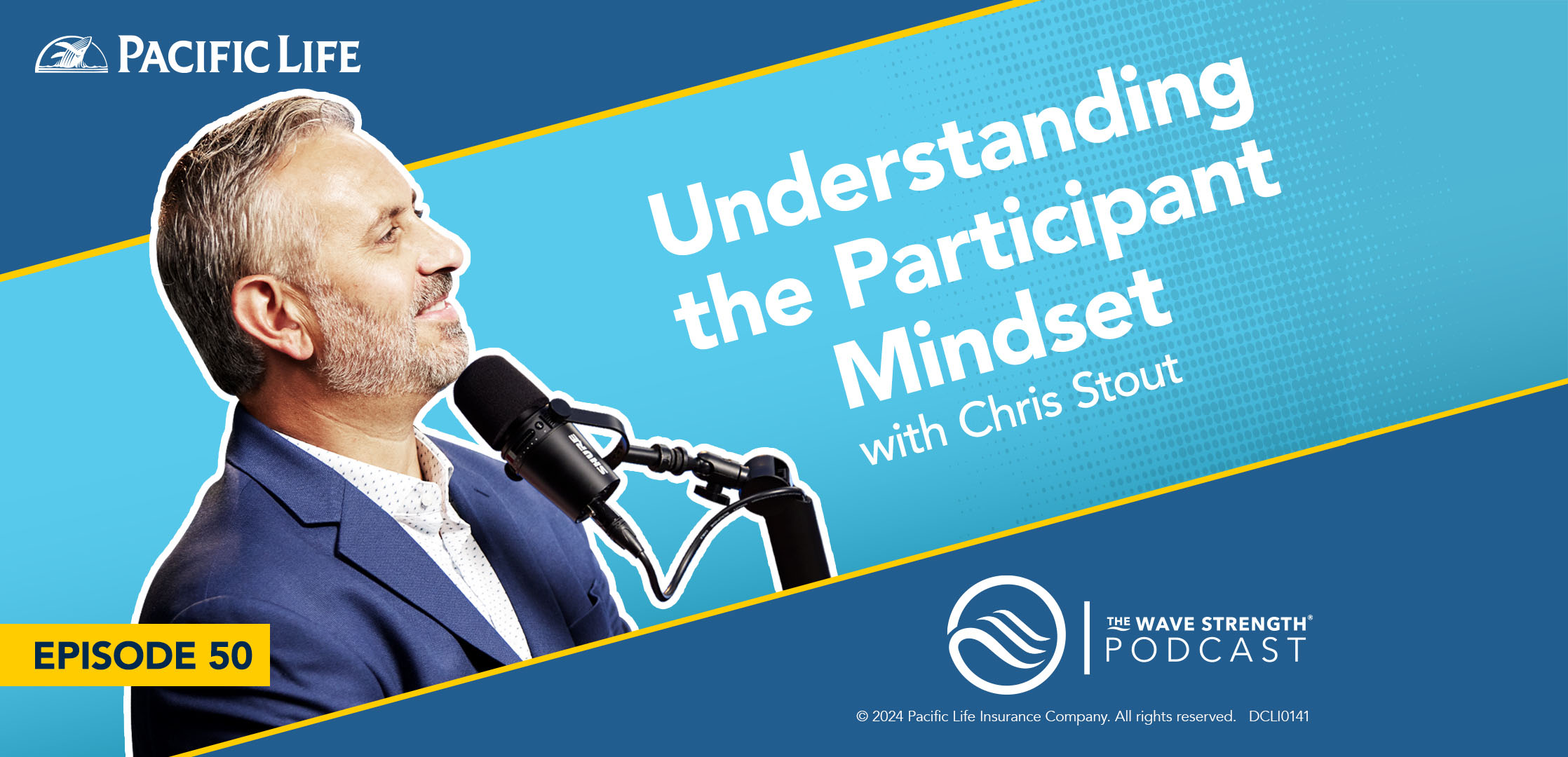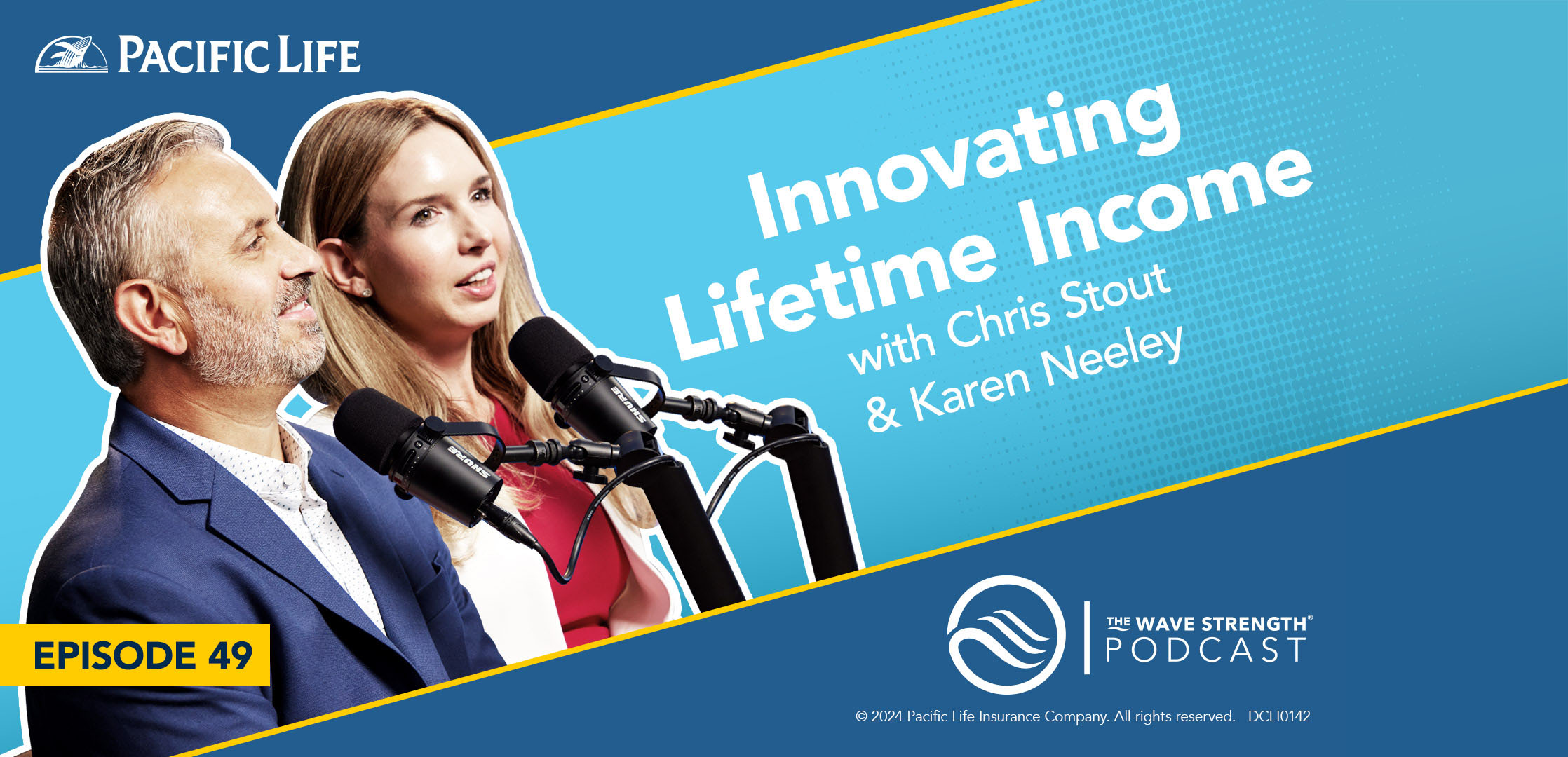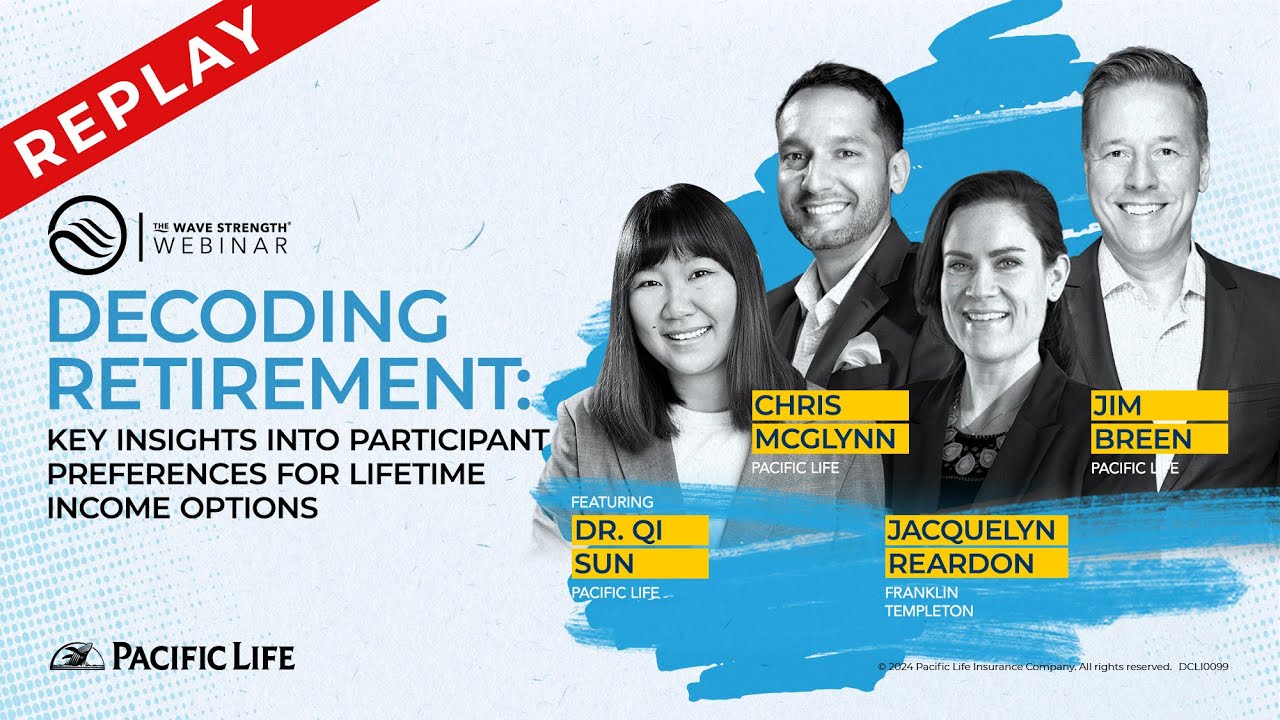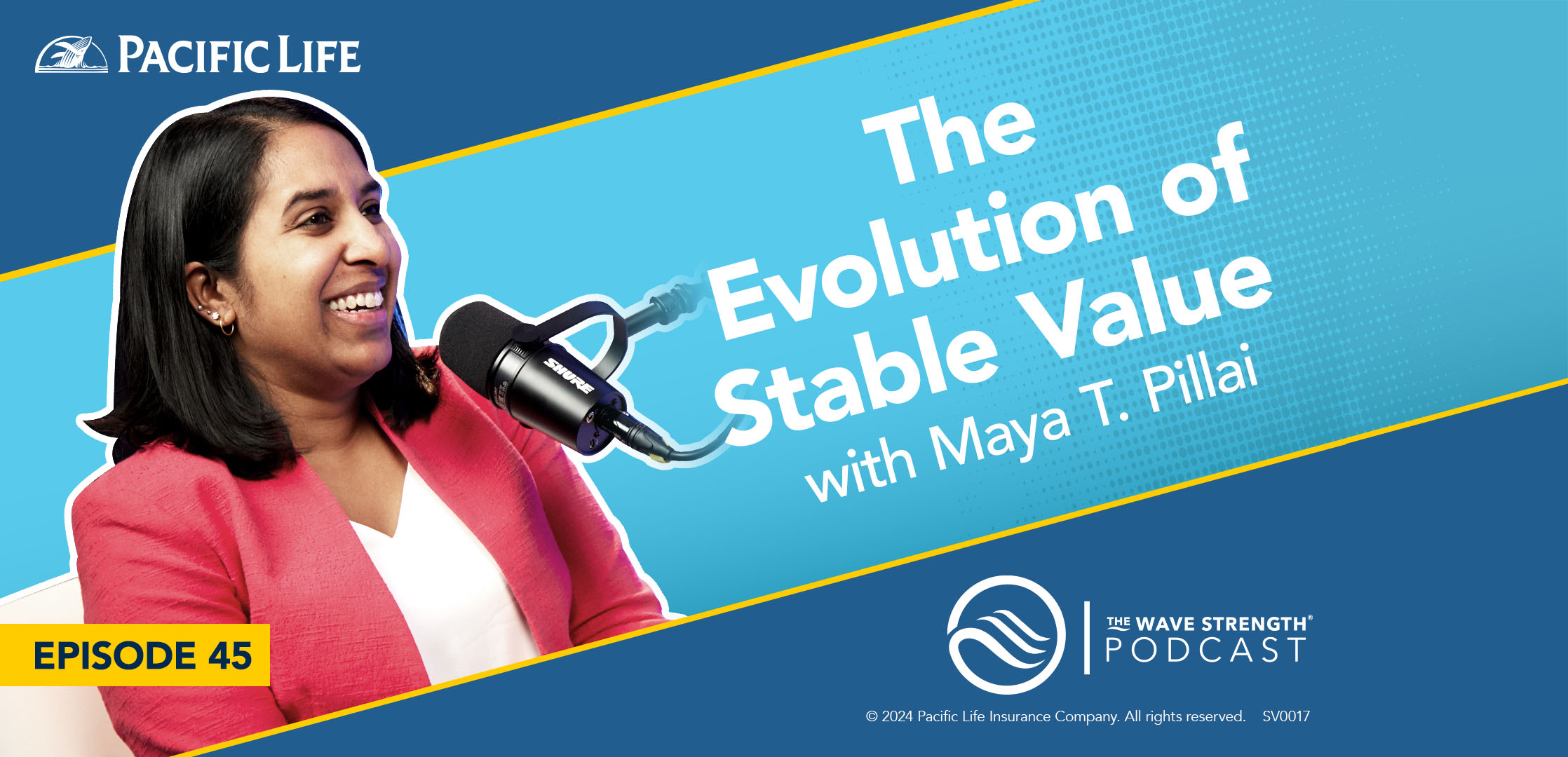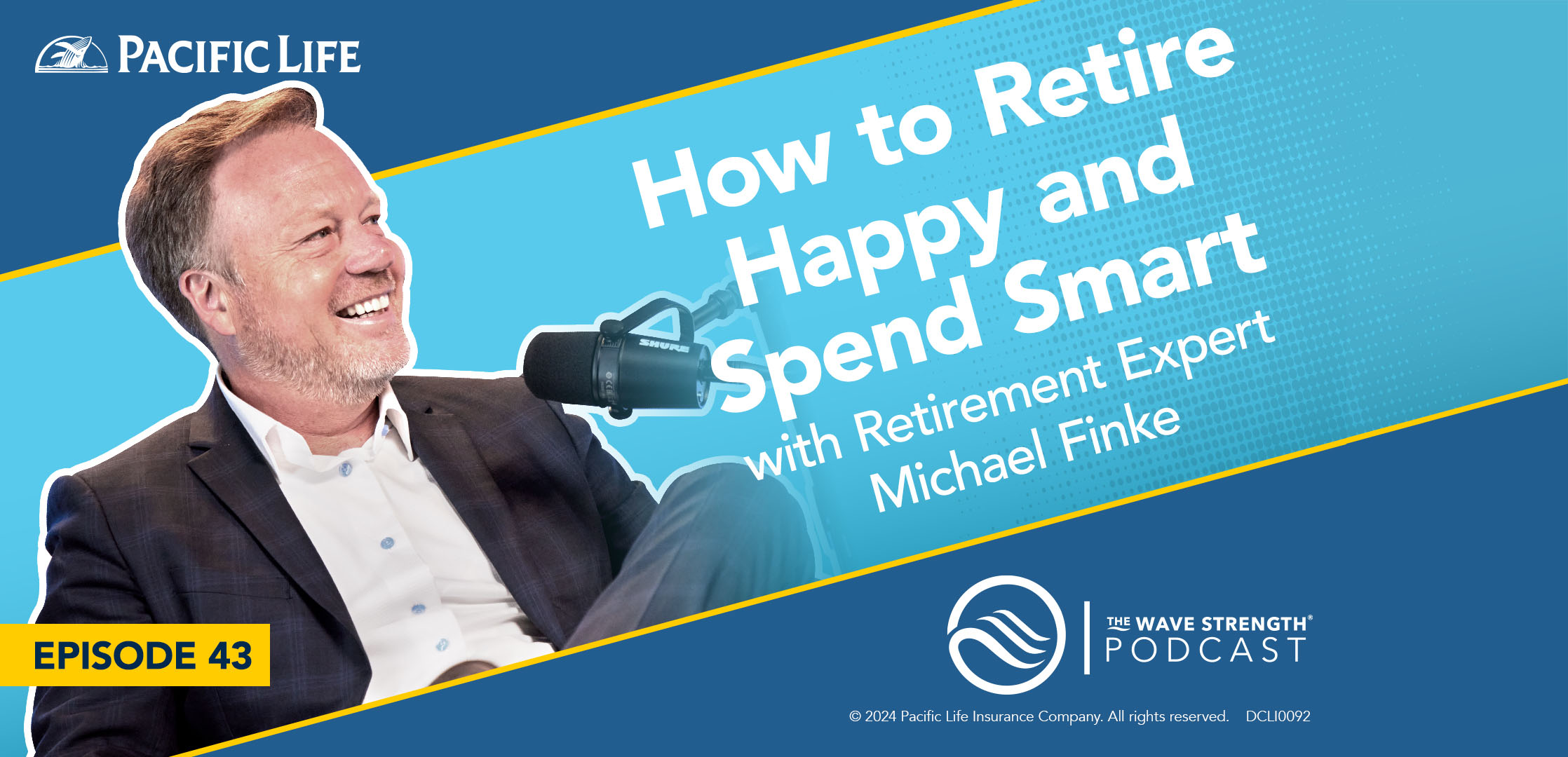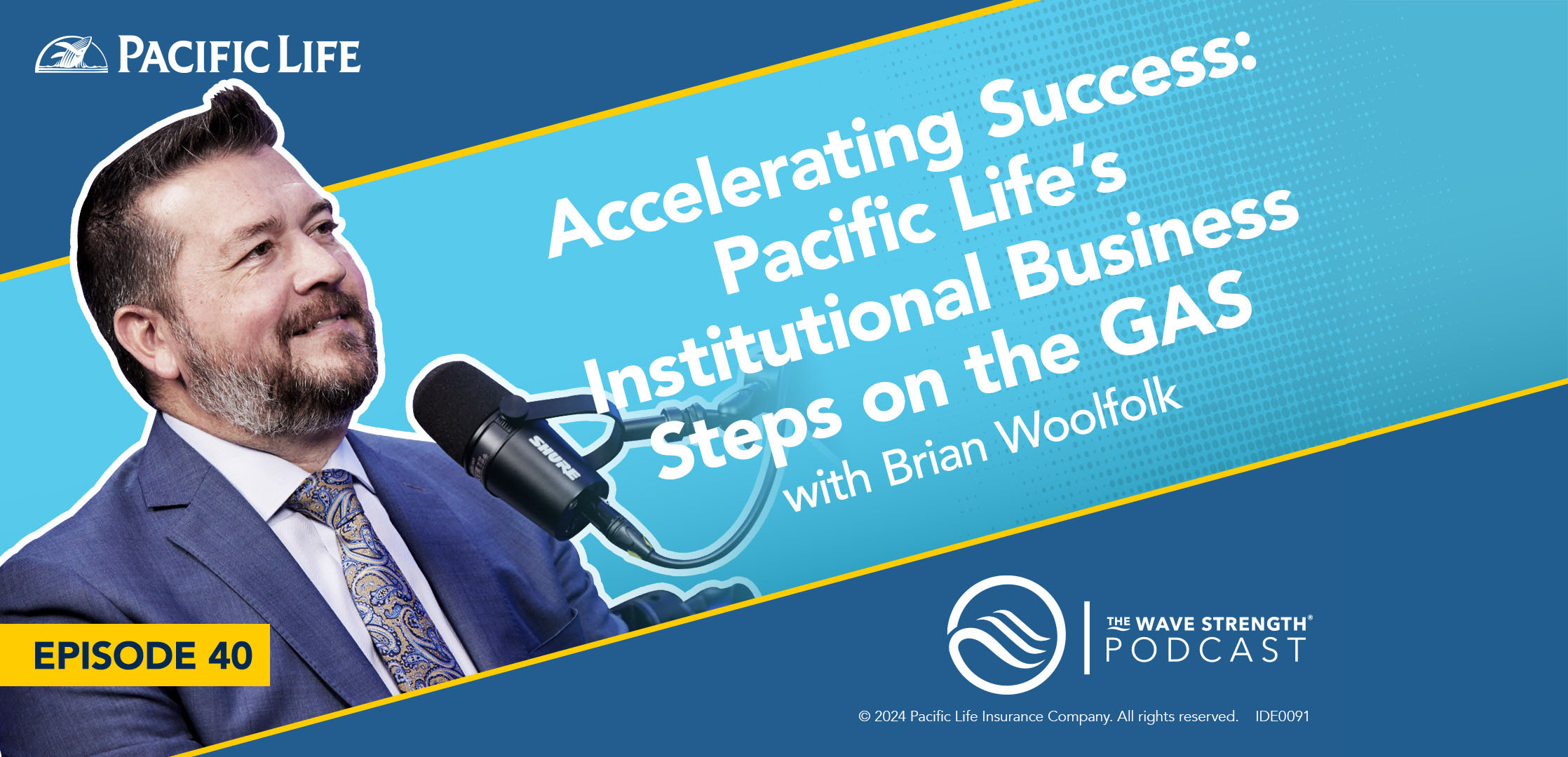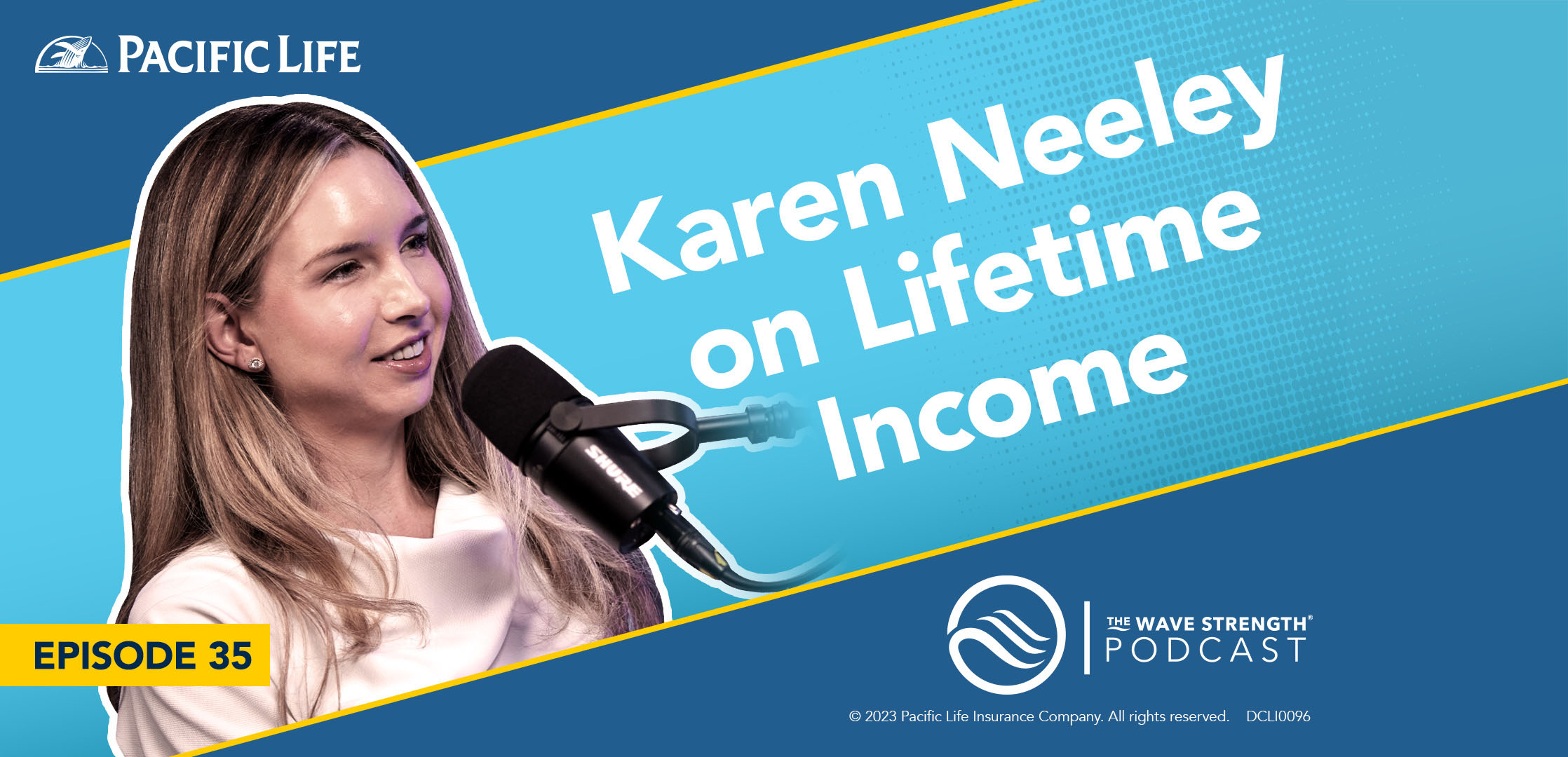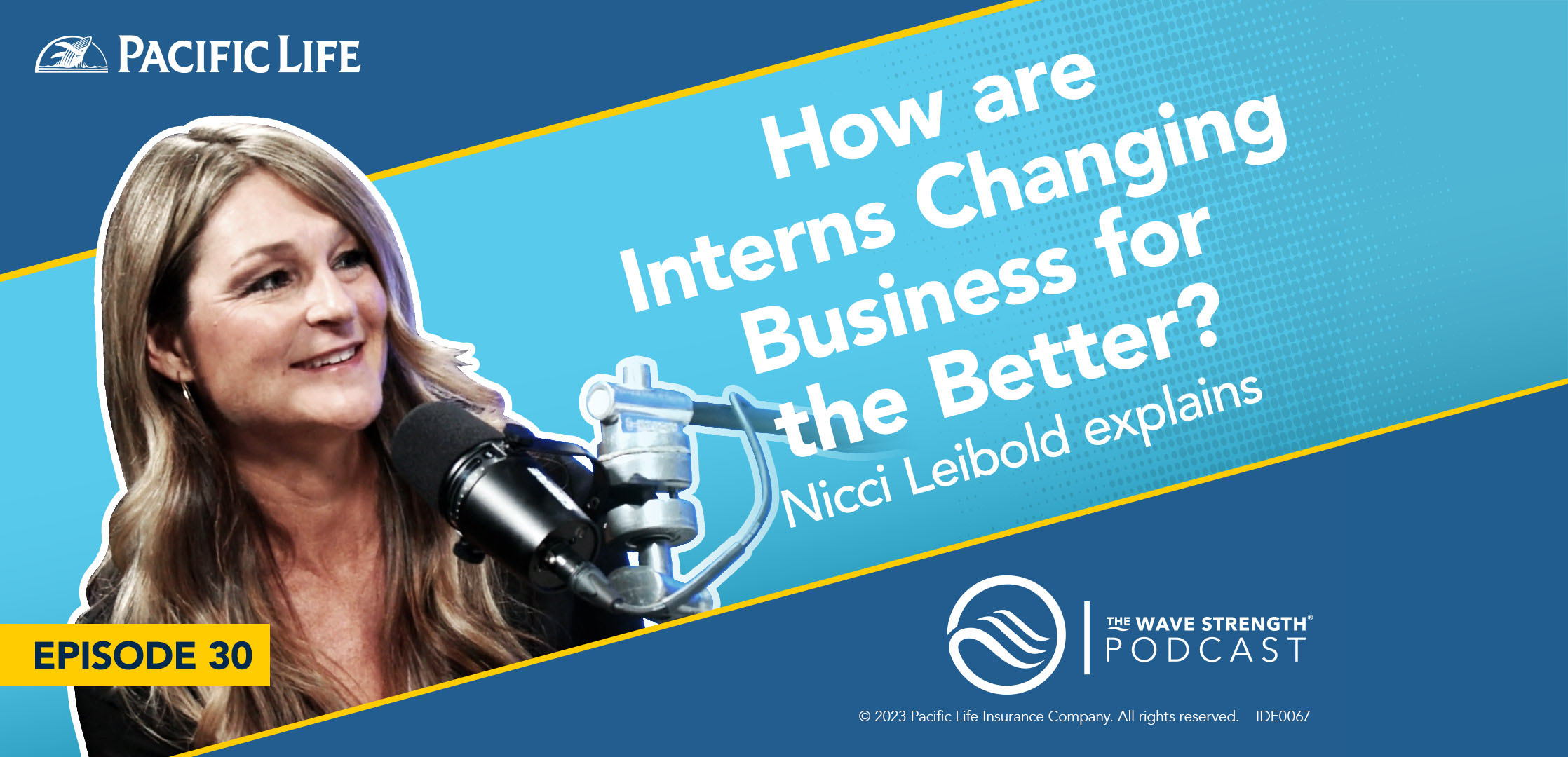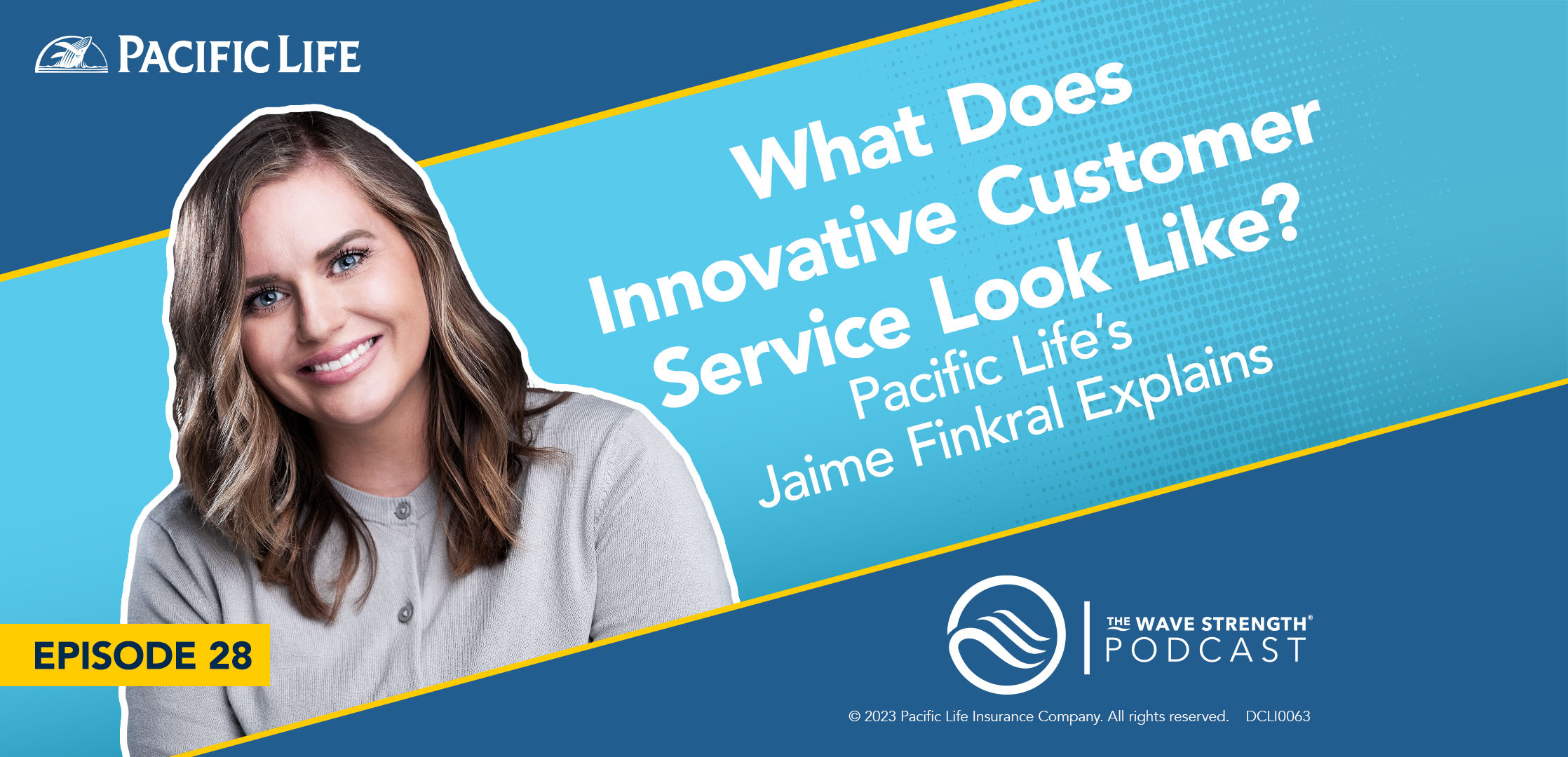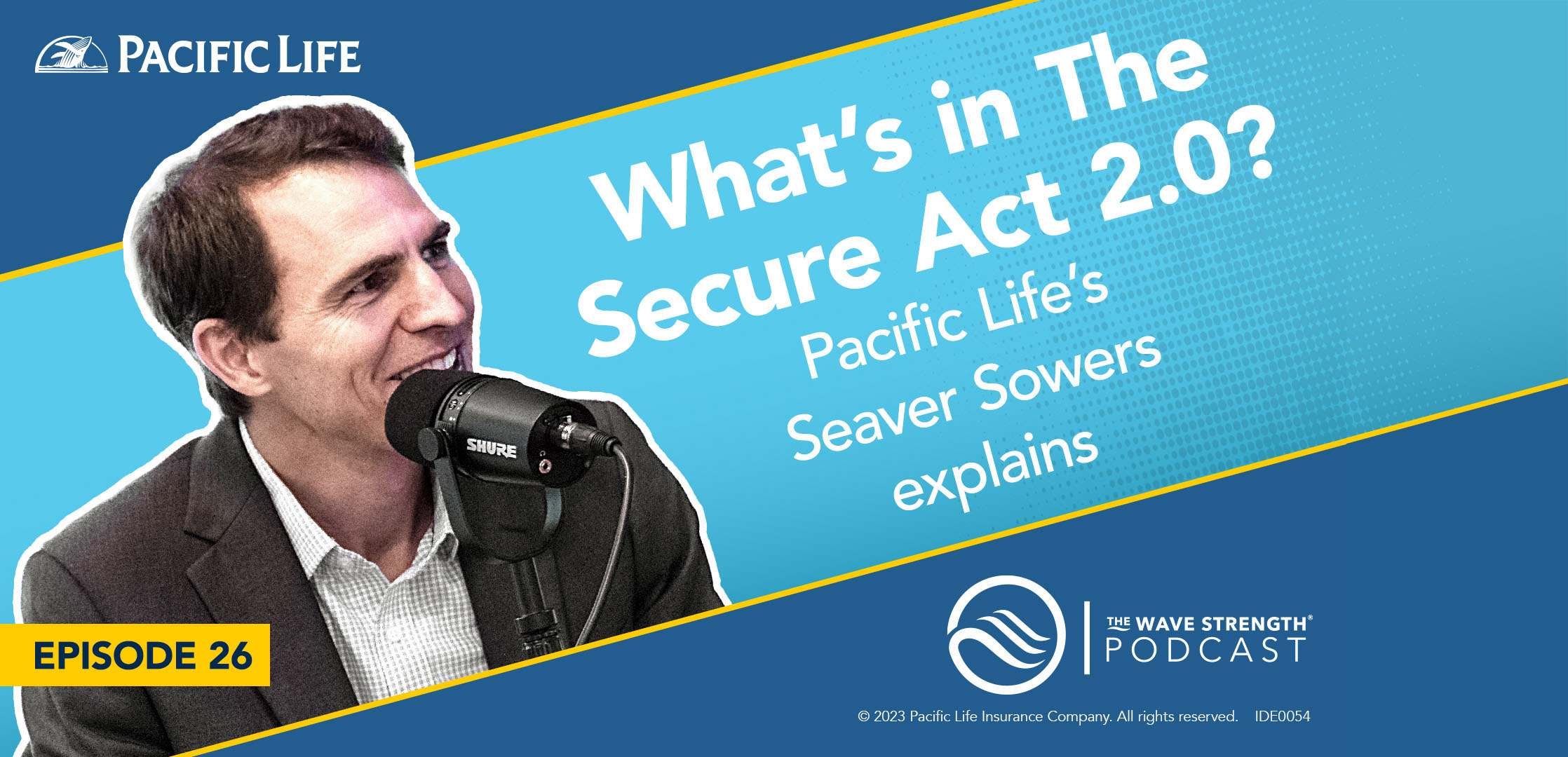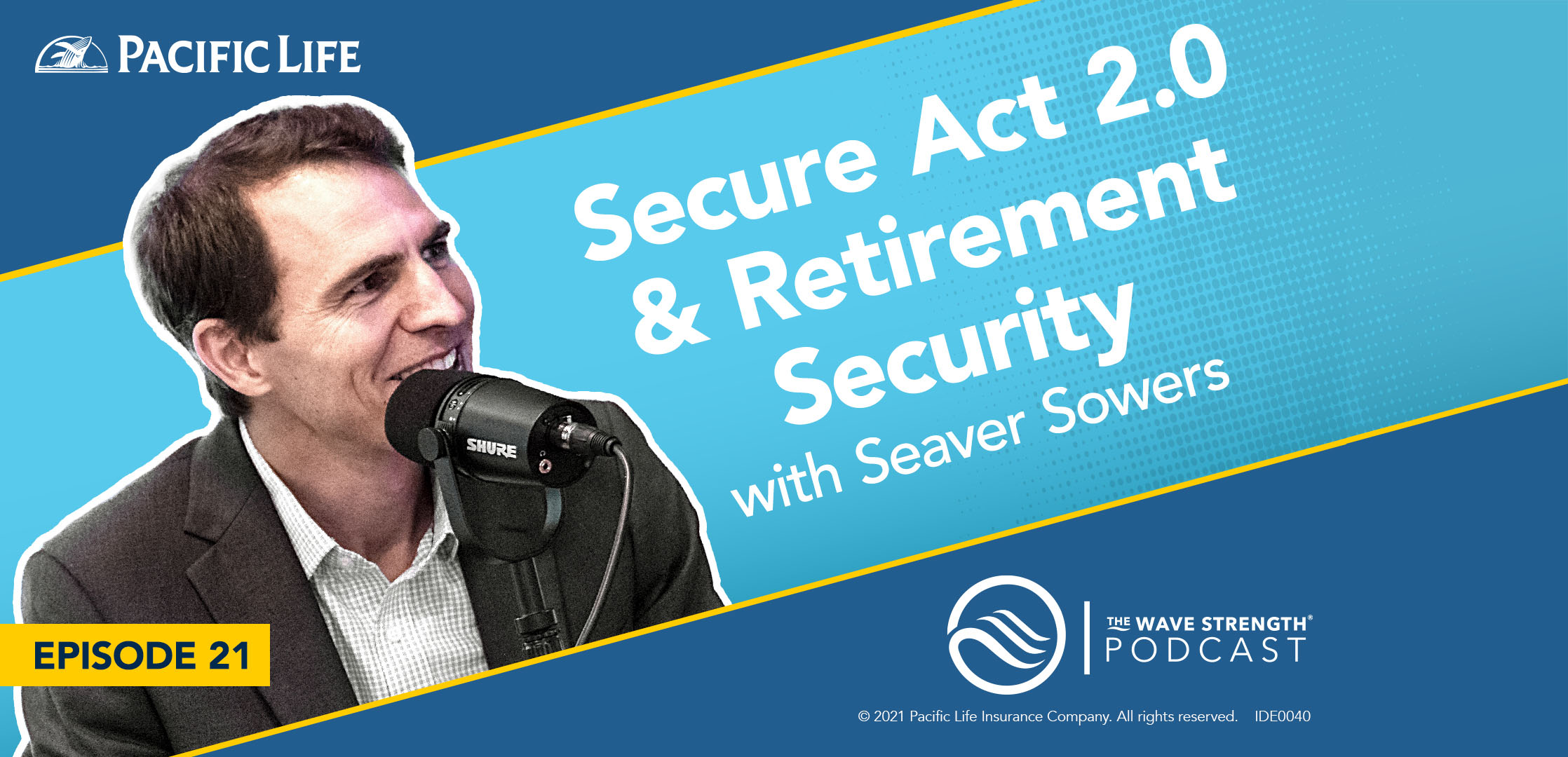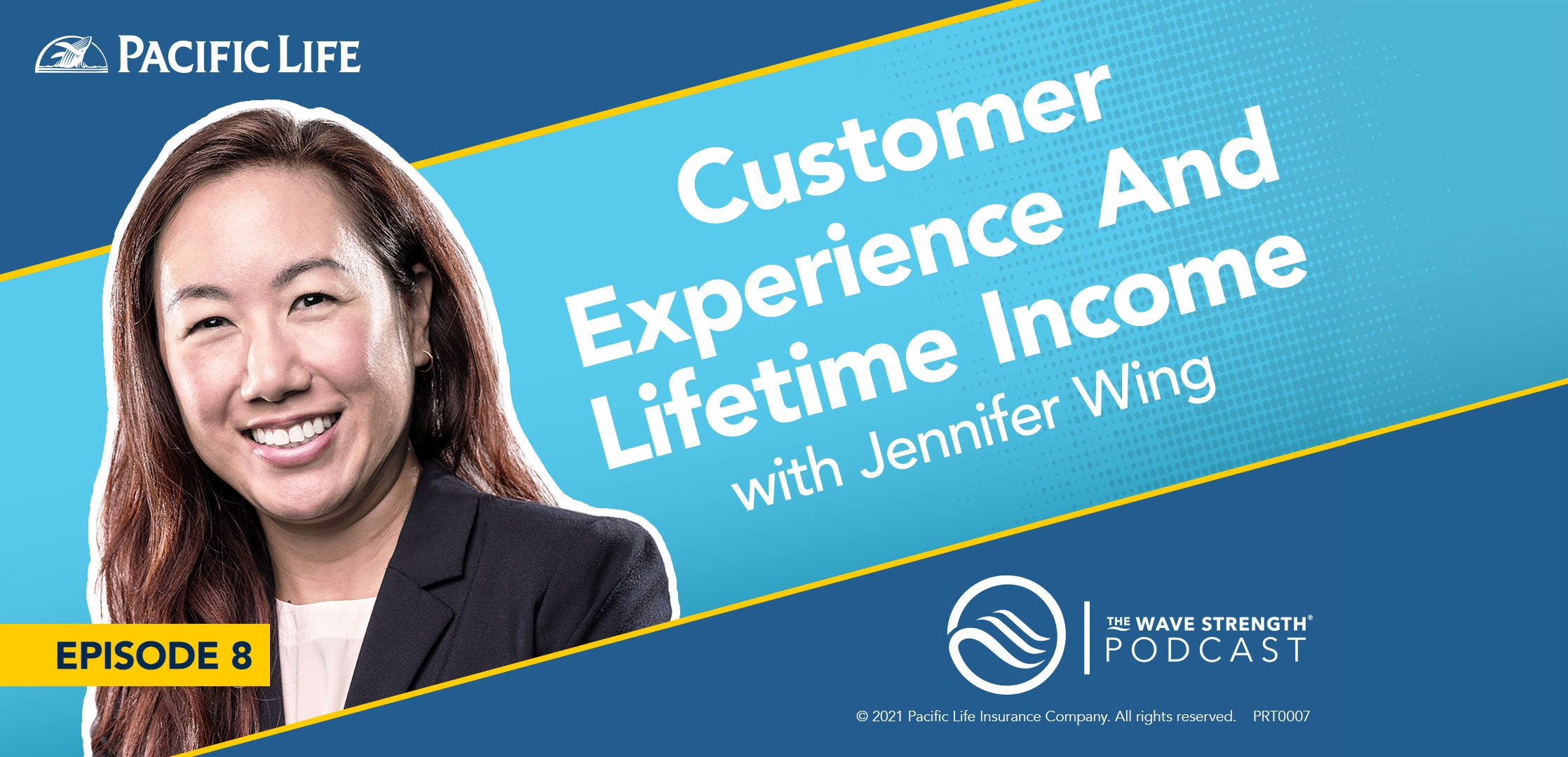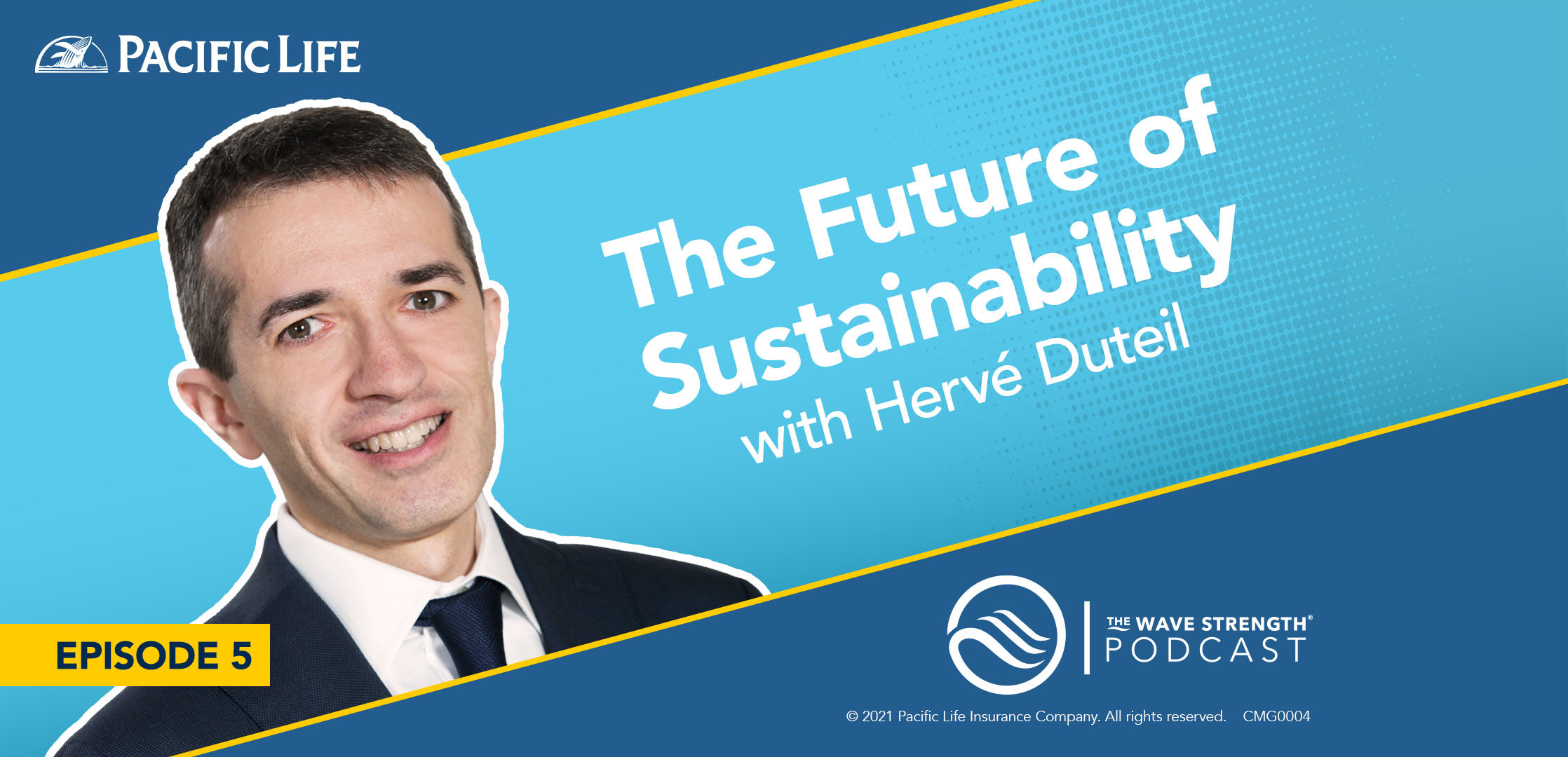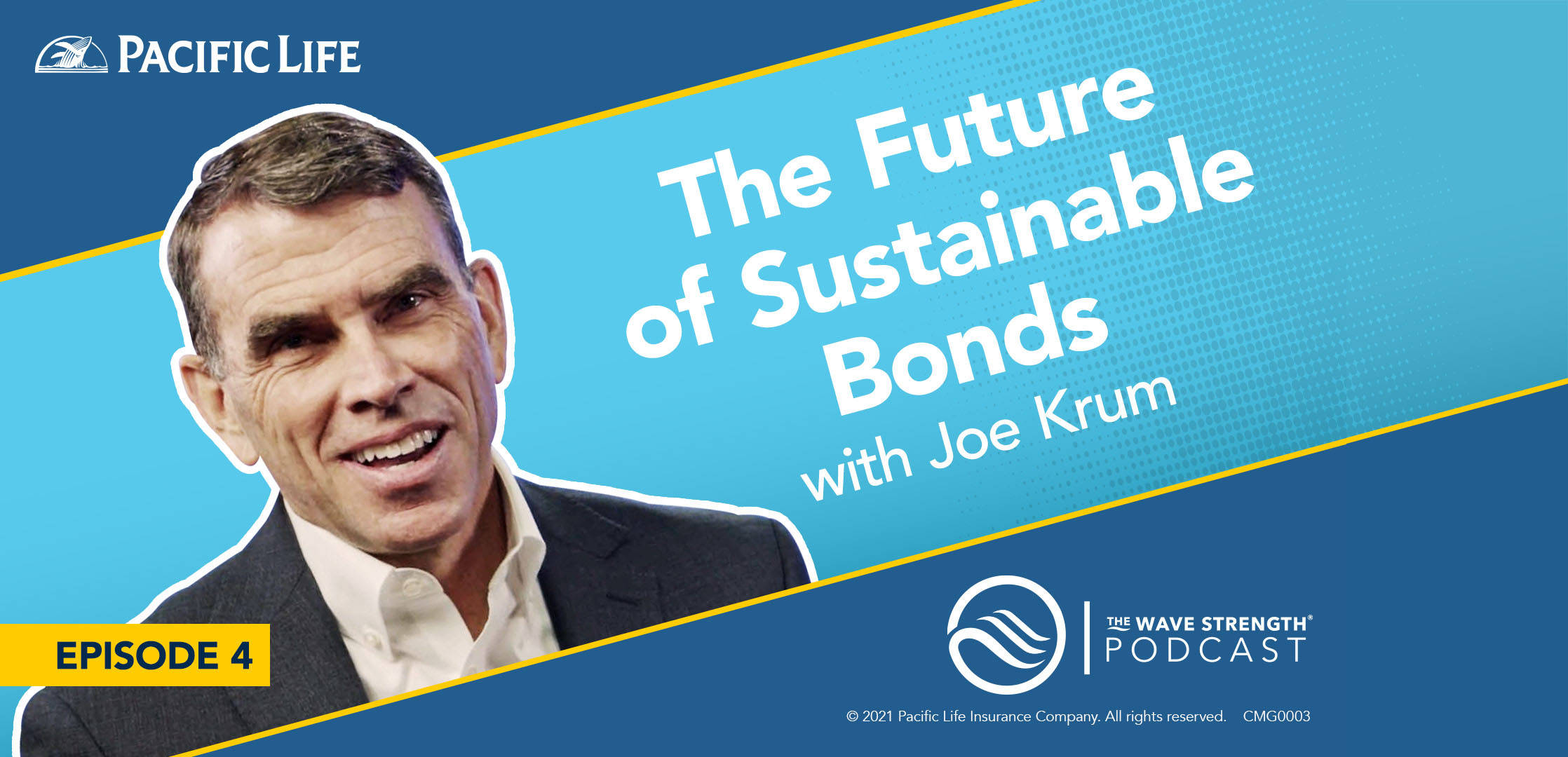VoiceOver: Welcome to the wave strength, innovative solutions for a secure retirement presented by Pacific life.
Jim Breen: Hello everyone, and welcome to another exciting episode of The Wave Strength podcast series. I'm your host Jim Breen, head of marketing with Pacific Life's institutional team. With us today live in studio is Michael Finke.
Jim Breen: Michael, thank you so much for taking time out of your busy schedule to, to fly out and join us today. Thank you, Jim. It's great to be here. Um, Michael, before we jump into the conversation today. Uh, you know, you've joined us on our show, uh, in the past, but for those who may not be familiar with your important
Jim Breen: work, perhaps you can share with our audience a little bit about your background and what you do.
Michael Finke: Sure. I, I'm a professor of wealth management at the American College of Financial Services. I'm also a faculty fellow at the Retirement Income Institute.
Jim Breen: Fantastic. And so, uh, a lot of great research and, and you, you kind of have your finger on the pulse of folks that are, uh, planning for retirement, approaching retirement and what happens in retirement.
Michael Finke: Um, we do a lot of consumer surveys, so I think I have a pretty good idea where people's heads are at these days.
Jim Breen: And, and I, I always appreciate our conversations. You always bring a very unique perspective, um, uh, to those of us that are trying to create these solutions for folks, um, you know, whether it's planning, approaching or in that stage of retirement.
Jim Breen: So, uh, thanks for joining us once again. My pleasure. Okay. Let's jump right into it today, Michael. So we have a couple of questions, um, you know, that, that, that stem from the data and the research that you have done. Um, what I'd like to do though is talk a little bit about, um, this, this term, a license to spend, you know, this, this term kind of appeals to me.
Jim Breen: Um, maybe you can share, um, some of the findings, um, And tell us why purchasing lifetime income or an annuity allows us to spend more money in retirement.
Michael Finke: In my surveys, I find that people are far more comfortable spending money from their income. So for example, Social Security or a pension, they don't have any compulsion spending up to the amount of money that they get every month from their income.
Michael Finke: But when it comes to spending money from their savings. They think completely different about it. So, uh, as an example, my own mother. Um, at the very beginning of retirement, she bought this very practical Volkswagen station wagon. It had a diesel engine. It got great gas mileage. Back in 2017, um, they, they had to buy it back because they had cheated on their emissions or something like that.
Michael Finke: I remember the story. Yeah. I remember reading this in the, in the news. And, uh, so, so she phoned me up from the car dealership. And they'd given her, by the way, a ridiculous amount of money for her old Volkswagen that had 90,000 miles on it. And she needed to take $15,000 out of her savings to be able to buy a new car.
Michael Finke: And she , she will spend every dollar of her pension paycheck every month and she'll go out to eat with friends or she'll fix up the house, but spending $15,000 out of savings was different. It, it had an emotional, there was an emotional barrier to doing that and I, I find that in my own surveys. In fact, I also find that from looking at the data on spending.
Michael Finke: You can compare two people, by the way, my mother ended up buying a very practical car, she spent her $15,000, I tried to get her to buy a Mercedes or something, cause she's always wanted one, but no, she said her friends would talk. Um, so she, she is a great example of one of those retirees who has money and savings, but doesn't feel like she can spend it.
Michael Finke: Only feels like she can spend Social Security and her pension. Well, fortunately, she has a pension. Today, a lot of retirees will retire without any source of pension. And they'll have Social Security, but it's not going to be nearly enough to make up for the lifestyle that they had before they retired.
Michael Finke: So what are they going to have? They're going to have this big lump sum of money. And my research finds that if you compare two retirees, one who has, say, $500,000 and the other one who has an income. Which you could buy right now with $500,000. So essentially, the wealth equivalent but in the form of income.
Michael Finke: And by the way, we need to start thinking in those terms. Yeah. That, uh, you know, framing at retirement, the purpose of our wealth is to fund a lifestyle and that's income. So the more you can frame on income, the less you focus on the lump sum because people fall in love with the lump sum that they have at retirement.
Michael Finke: But the reality is that lump sum maybe doesn't buy as much income as they had anticipated because they're going to live longer than they expected. Um, and that's another thing that seems to be an issue that a lot of people think, Oh, maybe retire was going to last 10 or 15 years. But for the kind of people who contribute to a defined contribution plan, they tend to be healthier than the average American.
Michael Finke: They have a higher income job. They tend to be more educated. Um, and for them, the average longevity for, say, a woman is going to be probably close to about 90 years old. So it's expensive to turn that lump sum of money into an income. Uh, but I feel like what's happening now is that people are not living as well as they could live in this new generation of defined contribution retirees because they're not thinking in terms of income.
Michael Finke: They're thinking in terms of lump sum and they're trying to preserve that lump sum. They fixate on that amount and they, if it gets smaller, it makes them unhappy. Uh, but that's, that's a terrible way to live because that's why you save the money in the first place was to live better. If you get to retirement.
Michael Finke: And you don't actually feel that you can spend the money that you've saved, then you haven't really succeeded. I mean, you sacrifice during your working years to save money. If you were automatically putting money away every month in your defined contribution plan. Uh, that's money you could have spent on going out to eat, or, you know, you could have bought a nicer car, you could have bought the Mercedes, or a nice house, but instead, you saved it for retirement, and then you get to retirement, and you wanna, there is just, just natural urge to preserve that nest egg, uh, but that's not the right strategy, and to the extent that we can get people to start thinking in terms of income, They're going to be better off.
Michael Finke: They're actually going to spend more. They're going to live better.
Jim Breen: That, that idea of retirement wellness, right, is so important, and I think overlooked. Like, as you mentioned, pension is not something that is just, you know, comes with the, comes with the game. You know, you have all these jobs that, um, you know, have had a tectonic shift, uh, in the last 10 years, 20 years especially.
Jim Breen: And, and how can we reframe or educate folks so that they can achieve a higher level of retirement wellness? Um, and I think, you know, do, do you see in your research, um, any sort of, um, effect on education, not just towards the end of retirement, but folks that, you know, five years from, ten years from, as we, as you even move closer to folks who are just entering the workforce?
Michael Finke: Well, I mean, many people don't have the capability of translating savings into income, to the extent that we can give them greater clarity about that, they're going to be in a much better position for understanding. I did a survey last year where I asked people, what is the number one thing that you would value in this case from a financial advisor?
Michael Finke: So what is the number one thing that you're having an issue with right now that you need help to be able to understand, to live better? Number one on the list was understanding how much I can safely spend in retirement. That's the big problem among near retirees is that they have this anxiety because they have no idea how to translate that lump sum into a lifestyle.
Michael Finke: And I feel like that's a problem, frankly, with the defined contribution system right now is that we figured out accumulation pretty well. Everybody's investing in these defined contribution, QDIAs, these target-date funds. They're automating their investments, which is great because I've seen what people do when they don't have automated investments and it's not pretty, um, you know, managed if people who try to manage their own investments by choosing, you know, even if the funds are pretty good, they tend to chase returns and they take all the money out of risk when stocks are cheap, and they put more money into stocks when they're expensive. They consistently underperform. But I think, you know, by automating this process, by making it so that the average worker is doing a much better job of investing and saving than they used to, they're automatically investing, they're automatically saving, that's great.
Michael Finke: But then they get to retirement and now we dump this huge pile of money in their laps. We say, good luck, uh, figure out how to invest. They have no idea what they've been investing in because they've been, it's been automated for them. Uh, they have very little conception of how to invest efficiently. So I feel like in many ways we're doing a disservice to the workers.
Michael Finke: That, you know, they should be specializing on whatever it is that they do for their employer. You know, if someone is a video expert, then that's what they should be focusing on. They shouldn't be focusing on the investment part of their life. Mm hmm. Because likely if they do, they're not going to make great choices.
Michael Finke: Yes. But then when they get to retirement, we place all the burden back on them. That's not fair. In a way, that's kind of cruel. They should have an easier pathway to taking the money and turning it into a lifestyle. Understanding how much I can safely spend. We don't give that to employees and we need to be giving that to employees.
Michael Finke: The same way that we've automated the accumulation, we need to begin automating the decumulation part.
Jim Breen: Yeah. Because that, that is such a vulnerable time in life. And as you mentioned a moment ago, you work your entire life, and if somebody is giving of themselves in that role, whatever it was that they did during their career, uh, you know, the last thing that that person should have to do is have added anxiety about, am I going to outlive my, my savings?
Jim Breen: Am I going to have enough in retirement to even achieve the lifestyle I was hoping I'd be able to live? And you're almost riding on that, that, that, the fence still your entire retirement wondering what's going to happen. You know what? I won't go on that trip, even though I'd really like to, or I won't get the Mercedes.
Jim Breen: And, and, and it's, it's just so important that we, we, um, as an industry kind of reframe the way in which we've been thinking so that we really can truly provide these solutions for folks, uh, not just through products and solutions, but training education at an early stage in that retirement planning process.
Jim Breen: So that it's not just in six months I'm retiring, I, where's the book? I need to cram and figure this all out, you know? So it's, it's part of their DNA early on.
Michael Finke: You know, it's kind of like health. I just did a, an analysis where I was looking at some of the relationships between physical health and financial health, and you can't cram your physical health at the last minute.
Michael Finke: Great example. Retirement. Um, you know, it's, it's one of, one of the things that I, I, What really struck me is that something like your, your VO2 max, which is your ability to process oxygen, just gets worse over time. And then what happens is we get to retirement, we want to go, you know, on hikes and we want to do something physical and we can't do it because we haven't made that investment.
Michael Finke: I feel the same way about the investment in money, that we've got to start thinking about it earlier on in our lives so that we're prepared for it later on in life. We can't invest our way out of a financial problem. In our late fifties when we're only a few years away from retirement. And to the extent that people have that lack of clarity, I think that just adds to the anxiety that makes them feel like they're not prepared.
Michael Finke: And part of the employer's job is to get people to feel like they can transition into the next stage of their life without having to experience that anxiety because they don't have the information that they need.
Jim Breen: Yeah. It's like, you know, having an expectation that you're gonna go to the gym. And you, you've never been before, but you know, at the end of that first session, you're going to be able to bench press 250 pounds.
Jim Breen: You know, you just can't do it. As you say, cram, you know, and you need to be able to work up to that goal and have a way in which you can educate yourself, but not just through education, but also a plan, a strategy that, that sets you up financially to achieve that wellness in retirement.
Michael Finke: Right. And then the question becomes like, what kind of information should we be giving them?
Michael Finke: Yeah. Should we be giving them information about stock investments? Mm hmm. No. You know, that, that's not helpful. Yeah. So, so they're going to try to, you know, they're going to end up making mistakes. We know that. So, the kind of education they need is simple. They need to understand how much they need to save.
Michael Finke: They need to understand how much a certain amount of money translates to in terms of a lifestyle in the future. That's the kind of information that they need to make rational choices. And there's not, there's only so many levers that you can actually pull. You can choose how much to save. You can choose what to invest in.
Michael Finke: Um, but for the most part, the, the set, the choices are relatively simple. Uh, but people don't have the tools that they need to make the choices that will make them feel comfortable actually making that transition.
Jim Breen: And you talk about providing, um, information at a level that's attainable by that, that participant, in a way that they can understand.
Jim Breen: And, you know, uh, for those interested in more content, I would encourage you to head over to YouTube, search, uh, The Wave Strength by Pacific Life, our thought leadership platform. Uh, we have, uh, many, many pieces of content that, that help, uh, in that process to try and bring. Um, ideas and solutions to the table that help educate participants.
Jim Breen: -- Michael has been with us on some of those pieces of content before. Um, we, we, we look forward to producing more content with you in the future about that, Michael, to try and help folks educate them at the right stage in the right way. Well, there's so much to talk about. Yeah. Yeah. Um, a couple more questions here.
Jim Breen: Uh, and, um, what I'd love to talk to you a little bit, um, maybe it is about your research. And so. You know, I understand you, you know, you've done a lot of research on retirement issues, obviously, as we've talked about. Perhaps you can share something that has surprised you in your time, um, um, you know, whether it's maybe recently or in the entire body of your work, something that just has stood out as, Boy, I had, I had no idea or that's not something that I thought people would be thinking about.
Jim Breen: Maybe it's reframed or helped you understand the needs of the participant better.
Michael Finke: You know, one of the things that I think is most interesting is that default investors tend to be those who benefit most from the default. So they tend to be the less financially sophisticated types. And if you actually look at investment performance.
Michael Finke: This is one of the things I love about defaults. It's that, you know, if you have a hospital system, the nurses outperform the doctors. Why? Because they're investing in these default thing. They're not moving the money around. The doctors are, you know, going in and out of the hot stocks. They're, they're, uh, follow, you know, following trends and investing at the wrong times, which means they're underperforming.
Michael Finke: So to me, defaults are fantastic. Defaults mean that the right types of employees are not messing with their investments for retirement. Now where defaults are really needed are in the post retirement stage, because now we have. Uh, this group of employees, you know, the majority of employees in many cases, 60 percent now are, are in some sort of a default target date fund.
Michael Finke: How do we get them to then transition and not make mistakes after retirement? Yeah. How do we get them to take all that money that we've, you know, if you're designing a plan, you can choose things like match rates and how much, uh, should be, you know, defaulted their savings rate, uh, what kind of investment to choose.
Michael Finke: But then at retirement. The same group who benefits the most from being in a default. Um, they're the ones who are most at risk because we haven't developed some sort of a transition for them. to start spending the money that they've saved in an efficient fashion. Um, and one of the, one of the problems is that, you know, they could either spend too much because they're not aware of how long they're going to live and they don't know how much is a reasonable amount to take out of their investment portfolio.
Michael Finke: They might take too much risk, which means that if they have a bad market, they have to cut back on their lifestyle significantly. On the opposite side, they might spend too little. Uh, and I think that for a lot of people, this is a big problem. Yeah. In the research that I see, that they have become so used to spending less than their income.
Michael Finke: They get to retirement and I mentioned this problem before, but that is the problem that you're always worried about the worst thing that could happen and you want to be able to preserve that nest egg as long as possible. It's, it's not a very, you're essentially leaving joy on the table by not having any sort of a clear transition into how you take that savings and turn it into income.
Michael Finke: Leaving joy on the table, I haven't heard that one, but that's a, that's an excellent way to put it. Well, you know, economists have their own name for it and it's called an unintended bequest. But leaving joy on the table, I think is, is more evocative because it's, it's the reality. It is. Like, we could have spent that money, but we didn't.
Jim Breen: Um. Okay. Last question for you. This is more of a, uh, you just, you know, something that I, I, I like to ask guests sometimes, but, you know, what advice, um, you know, would you give somebody that was just starting their career, uh, and, you know, maybe you can, uh, compare it to a, uh, a, a Michael Finke just entering the career.
Jim Breen: If, if your younger Michael Finke self would even listen to the older Michael Finke, but what is, maybe you could share some advice that you would give to somebody at that point. About retirement or about life in general? I mean, that boy, the, the a million dollar question there. Let's start with retirement.
Michael Finke: Let's start with retirement. Yeah. Cause the one thing that I always tell my relatives is at least make sure that you're saving enough to get the full match. So, essentially you'll get a 50 or a 100 percent return on all the money that you're putting into your retirement account. That's number one. Pay attention to how much you're saving.
Michael Finke: If you make more money, you need to save more. Why? Because social security is going to replace a lower percentage of your lifestyle. So, save more. If you're making more money, always take advantage of the match. But also, pay attention to you. Your most important investment is in yourself. It's a concept that, uh, economists like to call human capital and a human capital investment early on in the life cycle can have the biggest payoff, uh, in terms of your lifestyle throughout.
Michael Finke: Um, so don't just think about money. Also think about making an investment in yourself.
Jim Breen: I love that. Making an investment in yourself and always being open to growth, change, and, and improving to become the best versions of ourselves. I love that. I love that. Michael, I want to thank you so much for taking the opportunity to join us today, uh, on the podcast.
Jim Breen: Maybe you can share, uh, with our listeners, how can folks get in touch with you or connect with your research?
Michael Finke: Well, you can always, uh, go to MichaelFinke.com, my website, or you can see my research on Social Science Research Network, SSRN.com.
Jim Breen: Fantastic. And will you come back and join us again?
Michael Finke: Absolutely.
Jim Breen: Fantastic. Michael, thank you. And to our audience, I want to thank you for joining us today. On another episode of The Wave Strength podcast. And again, I want to encourage you head over to YouTube, Spotify, Audible, and search The Wave Strength by Pacific Life. And don't forget to hit like, and subscribe.
Jim Breen: Thanks again. We'll see you next time.
VoiceOver: This has been another episode of the wave strength presented by Pacific life. Don't forget to catch us on YouTube and make sure to subscribe. Although this podcast is presented by Pacific Life, the opinions and views expressed are those of the hosts and participants and do not necessarily reflect Pacific Life's views on any of the topics discussed.
VoiceOver: Unless otherwise noted, Pacific Life is unaffiliated with any other individual or company mentioned. Pacific Life is a product provider. It is not a fiduciary, and therefore does not give advice or make recommendations regarding insurance or investment products. Pacific Life, its affiliates, its distributors, and respective representatives do not provide any employer sponsored qualified plan administrative services or impartial advice about investments, and do not act in a fiduciary capacity for any plans.
VoiceOver: Pacific Life for first to Pacific Life insurance company and its subsidiary Pacific Life and annuity company insurance products can be issued in all states except New York by Pacific Life Insurance Company and in all states by Pacific Life and Annuity Company product availability and features may vary by state each insurance company is solely responsible for the financial obligations accruing under the products at issues this podcast was recorded on August 8th 2023
Jim Breen: Thanks for joining us on today's show. We'd love to hear from you join the conversation below and leave a comment on your thoughts on what the industry can do better for participants as it pertains to lifetime income solutions. And if you'd like more interesting content, click one of these links over here.


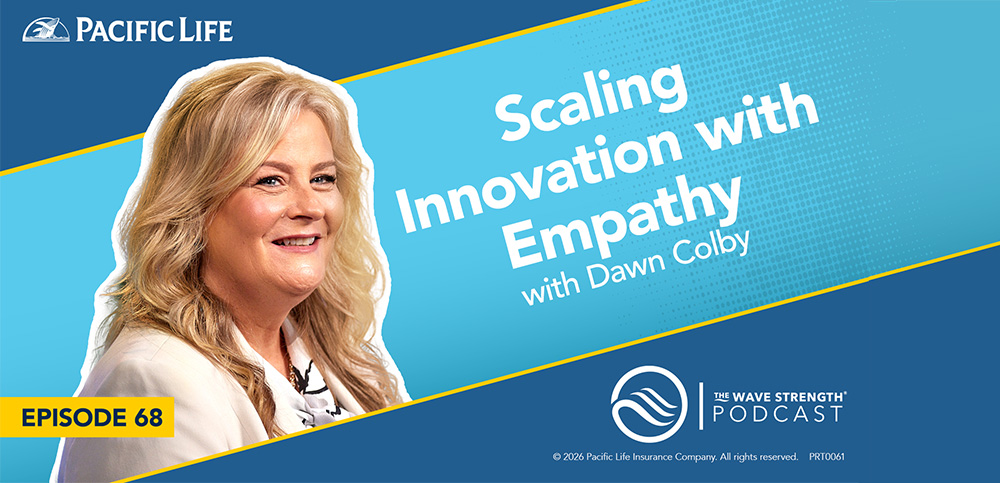
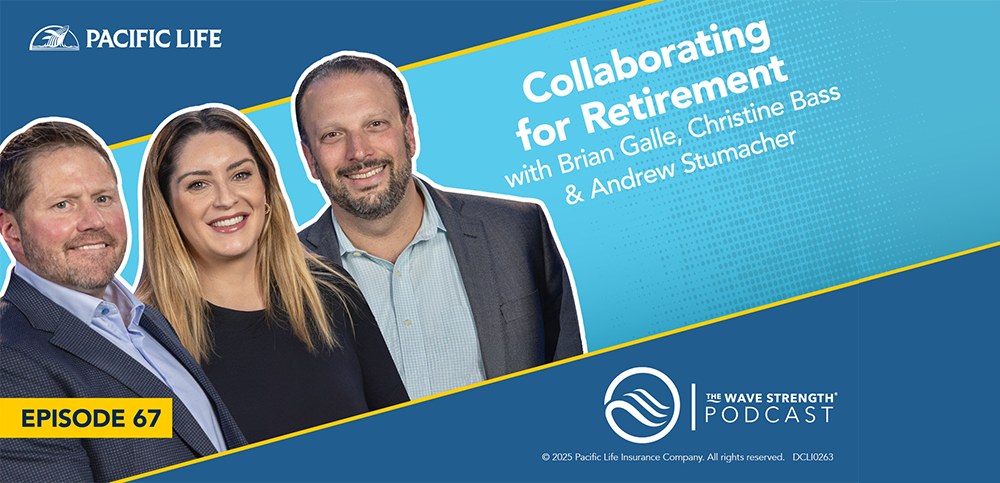
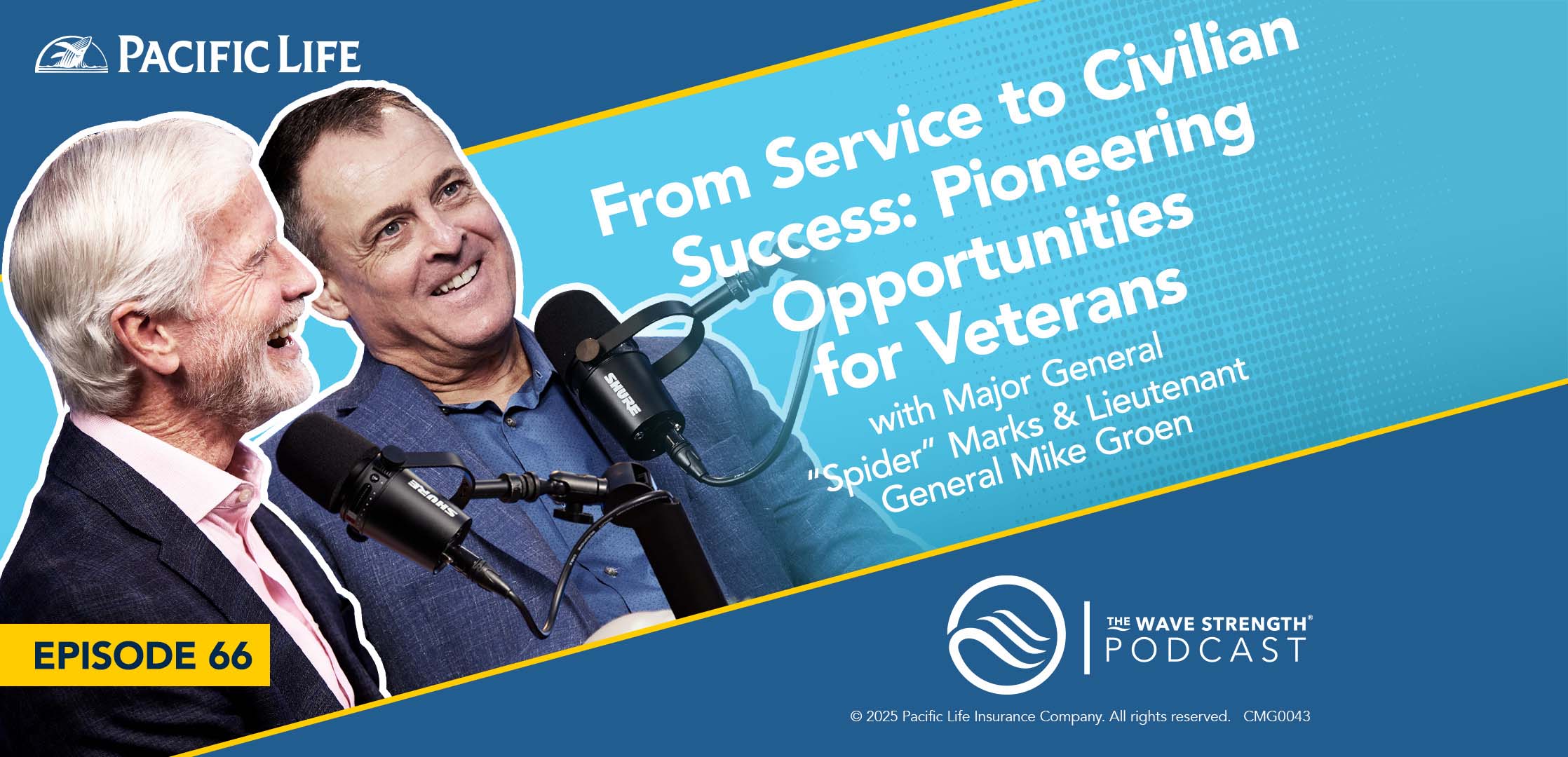
.jpg)

